“NUS goes beyond student wellness, and is on a journey to improve the wellbeing of academic, research, administration and executive staff.”
MIND YOUR BUSINESS
MR BJORN LEE (BUSINESS ’O6)


GOING BEYOND BASIC NEEDS
MS SITI ADRIANA MUHAMAD RASIP (ARTS AND SOCIAL SCIENCES ’16)
REACHING FOR THE STARS
THE STUDENT-BUILT SATELLITE, GALASSIA-2, BLASTS INTO ORBIT
FINDING
BALANCE RIGHT THE
CREATING — AND MAINTAINING — A SAFE, CARING ENVIRONMENT FOR THE STUDENTS AND STAFF OF NUS IS A COLLECTIVE EFFORT UNDERTAKEN AT ALL LEVELS OF THE UNIVERSITY.
OCT-DEC 2023 nus.edu.sg/alumnet/The AlumNUS THE ALUMNI MAGAZINE OF THE NATIONAL UNIVERSITY OF SINGAPORE
DR ANDREW EPAPHRODITUS TAY (MEDICINE ’05), HEAD AND DIRECTOR, NUS HEALTH & WELLBEING TEAM, OFFICE OF THE PRESIDENT
issue #135
Take a deep breath
Many of us might have experienced change – in my case, it was taking on the role as Chief Alumni Officer after nearly eight years as Chief Communications Officer – but when it comes to change, I realise it is important that we take care of ourselves and the people around us.
Hence, this issue focuses on health and wellbeing. We dive deep into how NUS has created and maintained a safe and caring environment for all students and staff. This edition features AI-powered apps that champion wellbeing at the workplace, and advice for parents and caregivers on how they can stay calm while helping their children deal with mental and emotional stress.
Another piece of news I would like to share is that starting 2024, The AlumNUS will be printed twice per year instead of quarterly. You will receive your next print issue in June 2024, and the second issue of the year in December.
This change is the result of a few factors. An important consideration is environmental.
NUS has established a long-term Campus Sustainability Roadmap 2030 which includes a Zero Waste component anchored on reducing consumption. Also, many of you have shared that you prefer to read our stories online.
In between the half-yearly print issues, we will be publishing more great content online. The AlumNUS has been going strong since 1989 and has won several awards from APEX, a platform which recognises publication excellence worldwide. Its latest win was in 2023.
We will continue to keep you updated on how NUS is engaging with our more than 350,000 alumni and put the spotlight on alumni success stories on our digital channels as well as our bi-annual print editions.
Thank you for your support! We welcome your feedback at alumnihelpdesk@nus.edu.sg

FIRST WORD
STAY CONNECTED WITH US AT: NUS Alumni @nus_alumni nus.edu.sg/alumnet uNivUS app
Ovidia Lim-Rajaram (Arts and Social Sciences ’89 ) Chief Alumni Officer
2023 has flown by and as we approach its close, it’s timely for us to take a breath and reflect on the year.
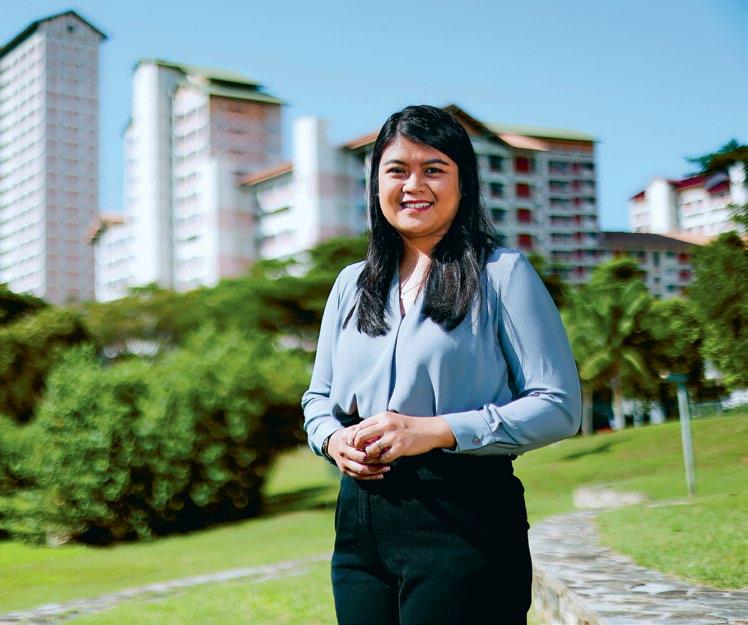

18 FOCUS Thriving in Best Form 28 PANORAMA Being the Pillar to Support the Pressure Dr Vivienne Ng (Arts and Social Sciences ’98) and Ms Sophie Cheng (Arts and Social Sciences ’04) 30 PURSUIT OF EXCELLENCE Mind Your Business Mr Bjorn Lee (Business ’06) 32 CHANGEMAKER Going Beyond Basic Needs Ms Siti Adriana Muhamad Rasip (Arts and Social Sciences ’16) 34 PATH LESS TRAVELLED Making a Cross-border Impact Ms Sharon Low (Arts and Social Sciences ’97) 36 FRONTIERS Reaching for the Stars 38 ALUMNI HAPPENINGS 42 ALUMNI HIGHLIGHTS Planting the Seeds of Change Ms Regini Lee (Computing ’22) 46 GIVING Leaving a Legacy In Education Ms Agnes Sng (Law ’84) 48 ALUMNI INSIDER A Fresh Twist on ‘Frisco Mr Arvind Ayyala (Engineering ’10) OCT – DEC 2023 32 CONTENTS CAMPUS UPDATES 02 NUS Soars into the Global Top 10 04 NUS Scientists Shine 06 Small States, Big Moves: Steering Through Global Power Plays OAR HIGHLIGHTS 08 A Renewed Sense of Belonging 10 Charting a Course into the Future 12 Ready to Shape Tomorrow 15 Teeing off to New Connections 16 Forging Lasting Bonds Through NUS Alumni Groups The AlumNUS is published by NUS Office of Alumni Relations. The views and opinions expressed are those of the authors and do not necessarily represent the views of NUS Office of Alumni Relations or National University of Singapore. Copyright 2023 by National University of Singapore. All rights reserved. Printed in Singapore by KHL Printing Co Pte Ltd. For more information or to read The AlumNUS online, please visit nus.edu.sg/alumnet/The AlumNUS OFFICE OF ALUMNI RELATIONS 11 Kent Ridge Drive #05-01 Shaw Foundation Alumni House Singapore 119244 Tel: (65) 6516-5775 Advisor MS OVIDIA LIM-RAJARAM (Arts and Social Sciences ’89) Editors MR ROYSON POH, MS WONG SHER MAINE & MS KATHERINE CHINN Production Advisor MS NOREEN KWAN Publishing Consultant MEDIACORP PTE LTD The AlumNUS clinched the following award at APEX 2023: AWARDS OF EXCELLENCE Magazines, Journals & Tabloids - Print 18
NUS SOARS INTO THE GLOBAL TOP 10
The National University of Singapore has jumped to eighth place in the latest QS World University Rankings, making it the top university in Asia.
IN A HISTORIC FIRST FOR THE UNIVERSITY, NUS HAS BROKEN INTO THE WORLDWIDE TOP 10, according to results from the latest Quacquarelli Symonds (QS) World University Rankings released on 28 June 2023. Now ranked eighth in the world, NUS is also the top university in Asia.
The University leapt three spots in this year’s rankings after holding steady at 11th for the past five years. This puts NUS within the top 1 per cent of all universities evaluated this year, ranking among many highly prestigious institutions worldwide.
Launched in 2003 and now in its 20th edition, the QS World University Rankings is a portfolio of comparative university rankings released annually. The 2024 edition features 2,963 evaluated institutions across 104 locations, and is based on a methodology that considers a range of
CAMPUS UPDATES 2 . THE ALUM NUS
factors, including academic reputation, employer reputation, research impact, global engagement and sustainability.
“We are delighted with NUS’ excellent performance, ranking eighth in the world and top in Asia according to the latest QS World University Rankings, and the recognition accorded as one of the leading universities in the world, and in Asia. This is a historic first for NUS to be placed within the top 10 globally, amongst many other prestigious institutions worldwide,” said NUS President Professor Tan Eng Chye (Science ’85).

“This is a testament to our capabilities and commitment to providing a world-class, and interdisciplinary education to nurture
agile and resilient graduates with diverse skills and knowledge for an ever-changing world. This achievement was made possible by the excellent contributions and outstanding work of our talented faculty, staff and students who remain deeply committed to flying the flag of our distinguished quality of education and creating positive impact in the classroom and beyond.”
“We are thrilled to acknowledge the historic achievement of the National University of Singapore in joining the top 10 of the 20th edition of the QS World University Rankings,” shared Ms Jessica Turner, QS Chief Executive. “This unprecedented milestone marks a remarkable moment for Asian higher education
and showcases NUS’ dedication to research excellence, innovation and sustainability.”
She further added, “NUS’ remarkable ascent not only highlights its outstanding academic performance but also underscores its commitment to producing graduates sought after by employers, as demonstrated by its impressive seventh place globally in the new Employment Outcomes indicator. The University’s distinguished faculty and researchers play a pivotal role in advancing knowledge and making significant contributions across diverse fields.”
The full results of the QS World University Rankings 2024 are available at: topuniversities.com
NUS RANKS WITHIN TOP UNIVERSITIES IN ASIA
NUS has also been consistently ranked among the best universities in Asia. The University came in third place for the fourth consecutive year in the latest ranking of Asian universities released by Times Higher Education (THE) on 22 June 2023.
China’s Tsinghua University topped the list, with Peking University placed second in the 11th edition of THE’s Asia University Rankings
Comprising 669 universities from 31 territories, the 2023 ranking assessed the universities on their core missions — teaching, research, knowledge transfer and international outlook. THE’s Asia University Rankings is based on the same 13 performance indicators used in THE’s World University Rankings, which are recalibrated to reflect the attributes of Asia’s institutions. NUS was ranked 19th in the 2023 THE World University Rankings
According to results of the latest QS World University Rankings 2024, NUS now ranks eighth in the world and first in Asia.
We are delighted with NUS’ excellent performance, ranking eighth in the world and top in Asia according to the latest QS World University Rankings, and the recognition accorded as one of the leading universities in the world, and in Asia. This is a historic first for NUS to be placed within the top 10 globally, amongst many other prestigious institutions worldwide.
This article was first published on 28 June 2023 on NUS News at news.nus.edu.sg OCT—DEC 2023 3
NUS President Professor Tan Eng Chye
NUS SCIENTISTS SHINE

Three faculty members from the National University of Singapore have been honoured as Asia’s most outstanding researchers.
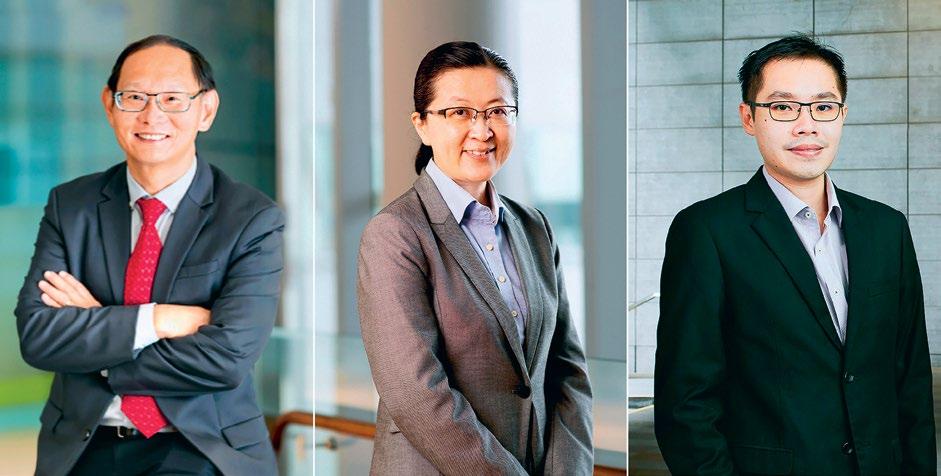
In 2022, she was elected to the US National Academy of Engineering (US NAE) as an international member for her outstanding work in bringing organic electronic materials into aqueous media, opening new doors for biomedicine, environmental monitoring, sensors and electronic devices. Prof Liu’s election to the US NAE for her revolutionary research earned her a place on this year’s Asian Scientist 100 list.
Prof Liu is an internationally acclaimed researcher and is a recipient of multiple accolades, including the President’s Technology Award (2016) and the Royal Society of Chemistry’s Centenary Prize (2021). She also ranks among the World’s Most Influential Scientific Minds and the top 1 per cent Highly Cited Researchers by Clarivate, with over 450 publications and 30 patents to her name.
PROFESSOR LIU BIN
THREE EXCEPTIONAL SCIENTISTS FROM NUS HAVE BEEN HONOURED IN THE 2023 ASIAN SCIENTIST 100 LIST FOR THEIR GROUND-BREAKING RESEARCH AND ACHIEVEMENTS. These researchers are: Professor Liu Bin (Science (PhD) ’01), NUS Deputy President (Research and Technology); Professor Hong Wan Jin (Affiliate Alumnus ’19) from the Department of Biochemistry under the NUS Yong Loo Lin School of Medicine; and Assistant Professor Koh Ming Joo from the Department of Chemistry under the NUS Faculty of Science.
Compiled by Asian Scientist Magazine, this annual list recognises the efforts and achievements of Asia’s exceptional scientific talents. This year’s honourees should have either received a national or international prize in 2022, achieved a significant accomplishment such as a scientific discovery, or demonstrated leadership that advances scientific enterprise.
A multi-hyphenate, Prof Liu’s career is one that is much revered by her peers. As a trailblazing scientist, she has made outstanding achievements and efforts in pushing the boundaries of science to make innovative discoveries in the fields of chemical and biomolecular engineering as well as sustainability and alternative energy research.
Aside from being a prolific researcher, Prof Liu is the founding director of the NUS Centre for Hydrogen Innovations, which aims to discover innovative strategies for commercialising hydrogen as a green energy source. Prof Liu also assumed the role of Deputy President (Research and Technology) from 1 April 2023, taking charge of NUS’ research strategies.
CAMPUS UPDATES
Prof Hong Wan Jin (left), Prof Liu Bin (centre) and Asst Prof Koh Ming Joo (right) are named in the Asian Scientist 100 list for 2023 in recognition of their achievements and internationally acclaimed research.
4 . THE ALUM NUS
Prof Liu (second from left) at a panel discussion during this year’s International Women in STEM and Medicine Symposium organised by NUS and the National University Health System.
PROFESSOR HONG WAN JIN
Prof Hong is a dedicated researcher of more than 30 years, supporting the development of Singapore’s biomedical research ecosystem. He is an Honorary Joint Professor at the Department of Biochemistry at NUS Medicine and the Executive Director of A*STAR’s Institute of Molecular and Cell Biology.
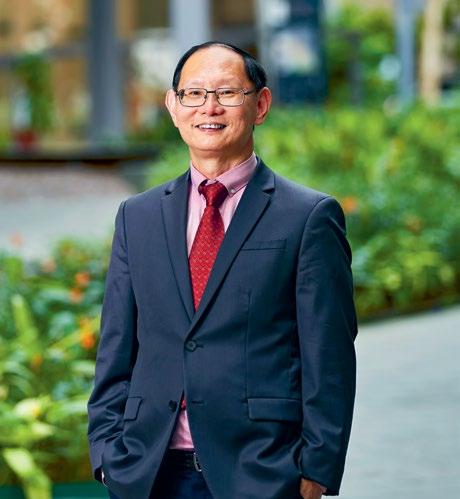
He has been honoured under this year’s Asian Scientist 100 list for being awarded the President’s Science and Technology Medal in 2022. Prof Hong was conferred this prestigious award for his extraordinary work in establishing Singapore’s biomedical sciences research ecosystem through forging strong partnerships between the public sector, academic and clinical research institutes, and promoting innovation to support Singapore’s economic development.
Prof Hong has a distinguished career in molecular and cell biology research, and has contributed significantly to the global scientific community’s understanding of membrane transport in the secretory
and endocytic pathways and the Hippo signalling pathway in human cancer. His research has resulted in more than 300 peer-reviewed publications, which have garnered over 27,000 citations internationally.
Apart from excelling in research, Prof Hong has also been commended for his active role in grooming young scientists. A stalwart leader, Prof Hong has held leadership positions in various scientific associations, such as the President of the Science Council of Asia, and member of the Board of Trustees for the Human Frontier Science Program.
ASSISTANT PROFESSOR KOH MING JOO
Asst Prof Koh is a rising star, as evident from the impressive accolades he has received for his exceptional research in the field of chemistry. His research focuses on sustainable catalysis and radical chemistry by developing technologies derived from abundant and non-precious materials such as base metals.
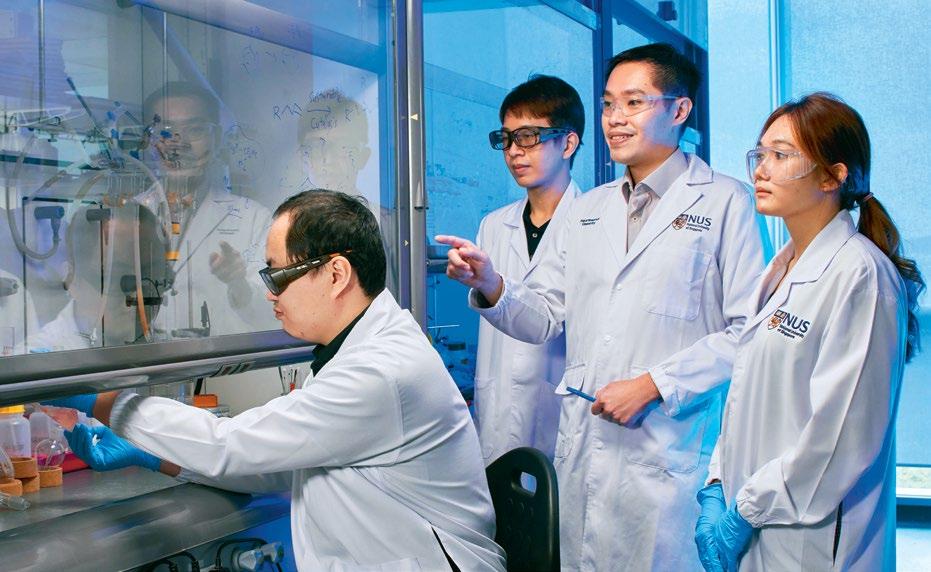
He received the Young Scientist Award 2022 presented by the
Singapore National Academy of Science for his research in sustainable base metal catalysis and radicalbased chemical technologies that revolutionise chemical synthesis. This recent achievement earned him a spot as an honouree of this year’s iteration of the Asian Scientist 100 list.
Asst Prof Koh is also a recipient of many prestigious awards for research and teaching, including the Innovators Under 35 (TR35) Asia Pacific Award (2021), Excellent Young Teacher Award (2019-2020), and Thieme Chemistry Journals Award (2022). Last year, he was also honoured as one of the Talented 12 Class of 2022 by Chemical & Engineering News (C&EN) for his work on sustainable catalysis.
Nurturing is in his nature as he grooms the next generation of researchers to give back to society. He participates in local and international science forums and outreach programmes to share his research work and experiences with young science enthusiasts, inspiring them to pursue their interests in science.
This article was first published on 24 July 2023 on NUS News at news.nus.edu.sg
A*STAR
Photos:
Asst Prof Koh (second from right) with team members from his lab.
OCT—DEC 2023 5
Prof Hong was conferred the President’s Science and Technology Medal 2022 for his outstanding contributions in building up Singapore’s biomedical sciences research ecosystem.
SMALL STATES, BIG MOVES: Steering through global power plays
Three big names in international relations shared their insights on the role of small nations in a capricious geopolitical realm at a recent conference to mark the 100th birth anniversary of Singapore’s founding Prime Minister Lee Kuan Yew.
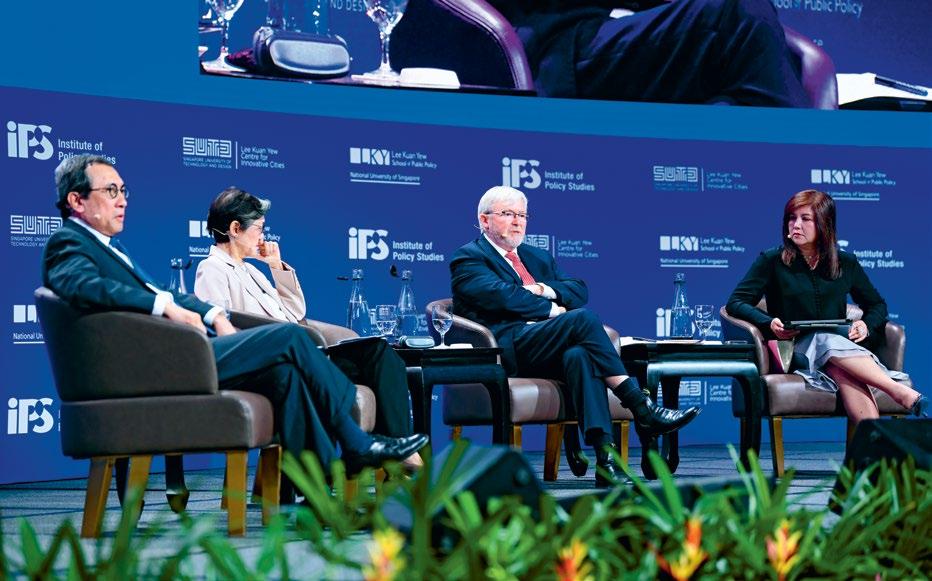 TEXT BY FRANCIS KAN
TEXT BY FRANCIS KAN
THE REINVENTING DESTINY CONFERENCE ON 14 AUGUST 2023 WAS MORE THAN AN EVENT; it was a compass for understanding the resilience of small states in today’s volatile geopolitical landscape. An engaging panel session, “The Small State in a Turbulent World”, featured remarks from prominent figures, each adding their nuanced perspective to the diplomatic discourse. The conference, which was attended by about 900 participants, was held at the Sands Expo and Convention Centre, and was organised by the Lee Kuan Yew Centre for Innovative Cities, Singapore University of Technology and Design; Lee Kuan Yew School of Public Policy and the Institute of Policy
Studies at the National University of Singapore (NUS). Moderated by Ms Zuraidah Ibrahim, Executive Managing Editor at the South China Morning Post, the panel featured the Honourable Dr Kevin Rudd, former Prime Minister of Australia; Mr Bilahari Kausikan (Arts and Social Sciences ’76), Chairman of the Middle East Institute at NUS; and Professor Chan Heng Chee (Arts ’64), the former Chair of the Lee Kuan Yew Centre for Innovative Cities and Ambassador-atLarge, Ministry of Foreign Affairs.
BEYOND MILITARY MIGHT
Dr Rudd, currently Australia’s Ambassador to the United States (US),
dived deep into the complexities of strategic equilibrium in an era of shifting power dynamics. He provided a sweeping analysis of global dynamics, emphasising the importance of maintaining this delicate balance. While military capabilities are crucial, strategic equilibrium also hinges on economic prowess, technological competition and adherence to international norms, he argued.
Especially for small nations, caught in the turbulence of global politics involving the US and China, Dr Rudd’s analysis offered a road map for preserving autonomy and negotiating leverage. “The truth is that the maintenance of strategic equilibrium is the most effective means of maximising the individual political agency of smaller states,” he said.
Dr Rudd’s remarks underscored the critical role that alliances and regional associations – such as the Association of Southeast Asian Nations (ASEAN) – play in enhancing

6 . THE ALUM NUS
The maintenance of strategic equilibrium is the most effective means of maximising the individual political agency of smaller states.
Dr Kevin Rudd
CAMPUS UPDATES
a nation’s policy freedom, as well as the perils of a breakdown in this equilibrium. “Almost all states, large and small, have a deep interest in maintaining the status quo, because all people want to maximise peace, prosperity and sustainability,” he said. “However, we cannot simply wish these things into existence. At its logical core, it requires the maintenance of strategic equilibrium as the fundamental enabling factor. [The conflict in] Ukraine provides a telling example of what happens when equilibrium and deterrence fail.”
A NUANCED BALANCING ACT
Prof Chan provided a lens into Singapore’s strategic response to the shifting global landscape. She explained the historical context of the nation’s growth, coupled with its ability to navigate a complex world order marked by fragmented alignments. “The intense geopolitical rivalry between the US and China, complicated by the Russian invasion of Ukraine, has converted our region, East Asia, unprecedentedly into a dangerous hotspot,” she said.
However, Prof Chan pointed out that the current tensions did not represent a return to Cold War dynamics but rather, an era marked by many nations exercising their sovereignty and agency in

a multipolar world. Against this backdrop, Singapore’s approach is multifaceted: maintaining strong relationships with both superpowers, strengthening regional organisations like ASEAN, and playing an active role in global trade agendas.
Prof Chan also highlighted the need for Singapore to make its voice heard on the global stage. “We must be able to speak up and be relevant. And to do that, we have to build up a strong, successful economy and society,” she said. “No one during the Cold War would have listened to us if we were a basket case. No one will listen to us now if we are a basket case.”
TAKING CONTROL OF SINGAPORE’S DESTINY
In his speech, Mr Kausikan outlined what Singapore needs to do to thrive in the global environment, focusing on three vital factors: perspective, agency and the primacy of politics. He encouraged viewing world events in their historical context, neither downplaying nor exaggerating their
significance. “We have now returned to a more historically normal period of international relations, and we’ll have to deal with the world as we find it,” he said. “Doing so requires us to promote a regional balance of major powers and maintain a strong capability for deterrence within that balance. There is no realistic alternative.”
Mr Kausikan argued that as a small state, Singapore is not without agency, and has shown time and again its ability to take control of its own destiny. He warned against succumbing to fatalism in the face of great power competition, and cited key reasons for Singapore’s success. “Singapore’s first-generation leaders were a rare combination of natural politicians and technocrats,” he described. “They were not just able to win political fights but to govern effectively,” he said, adding that our current fourth-generation leaders must become more like those of the first generation in these respects.
As the world grapples with myriad challenges and uncertainties, the Reinventing Destiny conference illuminated a path for small states like Singapore. Armed with the right principles and strategies, even small states can assert their place and successfully chart their course through the complexities of international relations.

OCT—DEC 2020 7
(Singapore) must be able to speak up and be relevant. And to do that, we have to build up a strong, successful economy and society.
Professor Chan Heng Chee
We have now returned to a more historically normal period of international relations, and we’ll have to deal with the world as we find it.
Mr Bilahari Kausikan
OCT—DEC 2023
A Renewed Sense of Belonging
NUS Homecoming 2023 marked the first combined reunion for generations of alumni from the Bukit Timah, Kent Ridge and Outram campuses.

MS LIM SWEE KIM (COMPUTING ’88), A RAFFLES HALL ALUMNA, GRADUATED FROM THE NATIONAL UNIVERSITY OF SINGAPORE (NUS) MORE THAN 30 YEARS AGO. But her connection to the University remains strong. The 59-year-old was among the more than 800 alumni who attended NUS Homecoming on 1 July 2023. “One of my reasons for attending was to reconnect with old friends, and experience the balik kampung (‘returning home’ in Malay) spirit once again,” Ms Lim said. Organised by the NUS Office of Alumni Relations and co-hosted by NUS Law and the Lee Kuan Yew School of Public Policy (LKYSPP), the event at Bukit Timah campus reconnected multiple generations of NUS alumni for a day of celebration. It marked the first combined Homecoming for graduates from the Bukit Timah, Kent Ridge and Outram campuses.
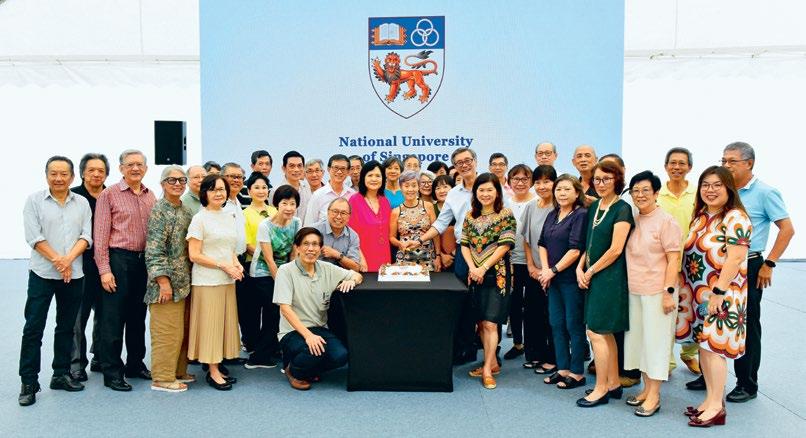

In her welcome speech, Ms Ovidia Lim-Rajaram (Arts and Social Sciences ’89), Chief Alumni Officer, NUS, said that Homecoming provided an opportunity to make new memories and friendships. “This is the spirit of #OneNUS. While there are a multitude of communities within the University, our affiliation to NUS surpasses geographic or campus bounds,” she said. The attendees reflected the diversity of the alumni community, with alumni from Hong
Kong, the Philippines and New Zealand flying in specially for the event.
LEARNING, CELEBRATING, CONNECTING
Pre-lunch activities featured seminars, workshops and entertainment by NUS staff and alumni. Highlights included a conversation between Professor Wang Gungwu (Arts ’53) and Professor Chan Heng Chee (Arts ’64) on “Living and Leading with Purpose”; a talk on “An Adventure in the Pursuit of Happiness” by Mr Jonathan Sim
Left: Members of the Class of 1973, who celebrate their 50th anniversary this year; Above: NUS Alumni Overseas Chapter Manila members.
NUS Chief Alumni Officer Ms Ovidia Lim-Rajaram addressing the Homecoming audience.
8 . THE ALUM NUS HIGHLIGHTS FROM THE ALUMNI OFFICE
(Arts and Social Sciences ’13); a cocktail-mixing session by Associate Professor Kevin SW Tan (Science ’94); and a line-dancing lesson led by Mr Lim Chee Kiang (Engineering ’83).
Mr Stanley Woo (Law ’22) enjoyed the illuminating dialogue between Prof Wang and Prof Chan. “The highlight was seeing the generations of distinguished alumni and marvelling at how NUS had made such a crucial impact at the key inflexion point of one’s life — and the resulting diversity and outstanding achievements,” the 25-year-old said. “Homecoming has made me alive to the fact that being a university student is much more than just being part of a school — you are part of a community so much larger than yourself or your own cohort.”
During lunch, attendees bonded over food, stimulating conversations and performances from NUS musical groups Red Dot Baroque, Resonance and The Jazzlings.
In his speech, Guest-of-Honour NUS President Professor Tan Eng Chye
(Science ’85) brought up the recent news that NUS had climbed from 11th to 8th place in the QS World University Rankings. This marked the first time the University had placed amongst the world’s Top 10. Besides thanking the faculty and staff who contributed to this global recognition, Prof Tan also extended his appreciation to alumni for their contributions to the University’s reputation and influence. “This remarkable growth story would not have been possible without the participation and support of our alumni community,” he said.
The news was a hot conversation topic among the attendees, many of whom expressed their pride at the University being ranked amongst the world's best. Dr Souhail Meftah (Design and Engineering ’23), 27, said, “It is a testament to the quality of education that we have received, and that makes me most proud.”
A VISION FOR THE FUTURE
Prof Tan pointed out that the University’s transformation is “not yet over”. “We are not standing still. In our next stage of growth, NUS is working towards our vision to be a leading global university, shaping the future,” he said, while encouraging alumni to remain involved in NUS’ next phase of growth.
Homecoming ended on a sweet note, with attendees celebrating four
milestones with a dessert buffet and cake: The 20th anniversary of the Yong Siew Toh Conservatory of Music, the 65th anniversary of Raffles Hall, the 65th anniversary of Eusoff Hall and the 50th anniversary of the Class of 1973.

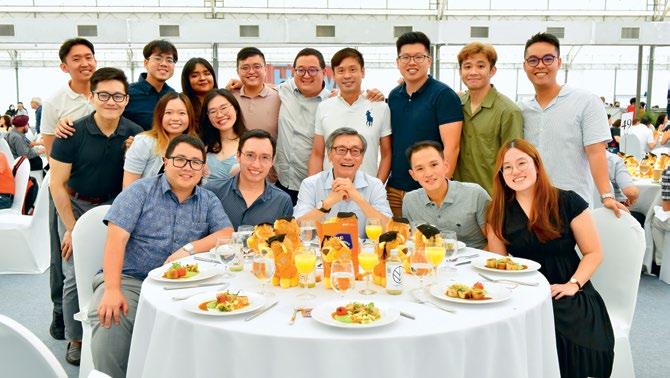
For Ms Lim, Chairperson of the Raffles Hall Association, the reunion sparked a renewed sense of belonging. While she had enjoyed meeting some of her peers and lecturers from Computing, reconnecting with alumni from Raffles Hall held a special place in her heart. “Although several of us Raffles Hall alumni did not know each other previously, when we began singing the Raffles Hall anthem, it immediately connected us regardless of age and background. That familiarity really warmed our hearts,” she said.
NUS ALUMNI: A LEGACY OF EXCELLENCE
GLOBAL REACH
350,000+ members connecting across 100+ countries.
RISING EXCELLENCE
NUS has soared from 11th to 8th place in the QS World University Rankings.
This remarkable growth story of our University would not have been possible without the participation and support of our alumni community.
Prof Tan Eng Chye
Alumni with NUS President Prof Tan Eng Chye and NUS Alumni Advisory Board member Mr Soh Yi Da (Arts and Social Science + USP ’14) (left front).
Former Eusoff Hall residents celebrated the hall’s 65th anniversary at the Homecoming event.
OCT—DEC 2023 9
CHARTING A COURSE INTO THE FUTURE
Plotting a career is never easy but Mr Ian Lau (Arts and Social Sciences ’12) has found his way into his dream job. He shares his journey as well as some ideas on how you can do the same.
 TEXT BY CHARMAINE CHAN
TEXT BY CHARMAINE CHAN
“I DIDN’T KNOW WHAT I WANTED TO BE,” SAYS MR IAN LAU CANDIDLY, WHEN ASKED ABOUT HIS CHILDHOOD DREAMS. Unlike some children who might have aspired to become doctors or astronauts, Mr Lau had no idea. And this is why he empathises with young adults who are trying to figure out their career paths. “We can’t always expect 18-year-olds to know what they want to do,” he says.
The affable 35-year-old is currently a director at the Brunswick Group, a global advisory firm that specialises in offering companies focused guidance on critical issues — from capital markets to public affairs, social issues, crisis management and employee engagement. “I worked on the UBS acquisition of Credit Suisse and also advised on the IPO of Saudi Aramco,” Mr Lau says, describing some of his projects. “In the two months leading
up to that IPO, I was regularly travelling to Saudi Arabia, and I was there when one of their oil fields was hit by a missile. We had to help them throughout that crisis.”
When talking to Mr Lau, what comes across strongly is how fulfilling he finds his work — it is dynamic and exciting, he meets people from all over the world, and no two days are ever the same. “I love my job,” he says. “I’m glad I’m able to make a difference in the world.”
THE PATH TO THE PRESENT
So how did a kid who had no clue end up in his dream job? “When I graduated, I had no job,” he recalls. “I knew what I didn’t want to do, but I didn’t know what I wanted to do.” He got his first role as a business banking manager
at OCBC after meeting someone from the bank at a job fair and going for an interview. Although he was comfortable in the industry and liked his work, he soon realised that it wasn’t for him. “There is a very specific career path in banking,” he says. “But I somehow knew I wanted a different kind of journey.”
While studying at the National University of Singapore (NUS), Mr Lau completed two internships at a consultancy firm. The experience gave him enough knowledge and confidence to make an industry switch. He took up a position as associate director at WeR1 Consultants in January 2014.
“The main reason I moved was that I felt I could pick up a lot of relevant lifelong skills in that job,” he says. “Specifically, it would give me a good understanding of capital markets, help me polish my writing and allow me to build my own network because I would be dealing directly with CEOs and company founders.”
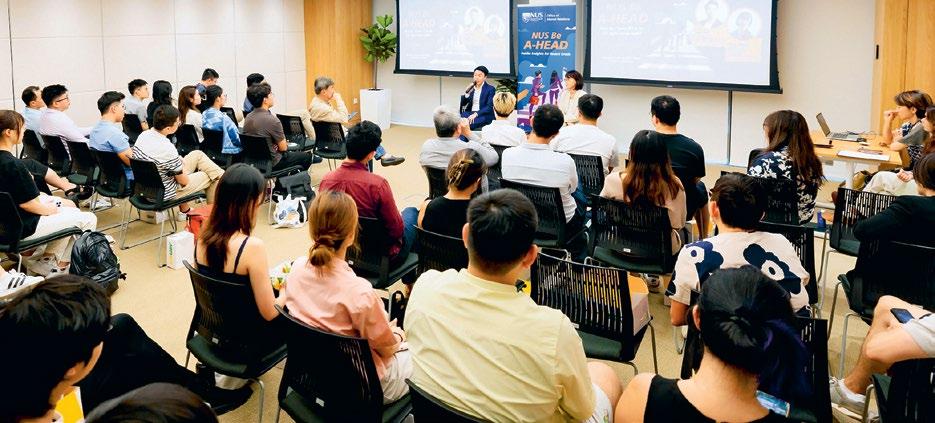
10 . THE ALUM NUS
Mr Lau captivated the audience by sharing his experiences.
Speaking at the inaugural NUS Be A-HEAD career seminar on 23 August, Mr Ian Lau offered wise words for those seeking insights on professional growth.
HIGHLIGHTS FROM THE ALUMNI OFFICE
3 TIPS FOR YOUR CAREER TRACK
1. LOOK AT THE BIG PICTURE.
“Don’t be too focused on short-term gains, like a glamorous title or how much money you can earn, but think about how the job will benefit you in the long run.”
2. FOCUS ON BUILDING SKILLS.
“There is a saying that it takes 10,000 hours of practice to gain mastery of a skill. It’s important to spend time honing your skill, whatever that might be.”
3. GIVE EVERY TASK YOUR ALL.
“This could be a big or small thing. It can mean showing up, being present, asking the right questions, venturing outside your comfort zone or spending time networking when you would rather go home.”
He stayed for four years before he took the next step. “I wanted something on a bigger scale, but I didn’t know what that would be,” he says. He was headhunted for a job at Brunswick, and he went for the interview, even though he initially knew little about the company. “I saw it as an opportunity to train my interview skills,” he confesses. “But within five minutes, I knew that this job was everything I had been looking for. So I was really glad I took the chance and had prepared for it.”
GUIDING PRINCIPLES
When asked about what has helped him steer his career through the years, Mr Lau talks about focus. “When it comes to my career choices, I’m very calculated, never brash,” he says, referencing his decisions in the past to accept a pay cut, extend his military service or quit a job. “I always think about the long term.”
Graduates today face challenges that never confronted their predecessors — a volatile, constantly changing landscape where technology has transformed everything. Working from home is now
commonplace, but the pressure to work 24/7 is constant, while the rise of AI casts a looming shadow over many industries.
But rather than viewing AI as a threat, Mr Lau prefers to stay positive and look out for opportunities. “Rather than thinking of its impact in a negative manner, we can think of how AI might create positions for people,” Mr Lau says. “And those who are able to utilise AI quicker than their peers will be the ones to accelerate their careers.”
He adds, “People need a global mindset as they enter the market today. And they have to be in tune with what’s happening in the world around them.”
Mr Lau may not have known what specific job to gun for when he was younger, but he has always known what he wants out of life. And he believes everyone does, too. “Whatever I did, I knew I wanted to carve a niche or build a brand for myself,” he says.

And when you discover what you want to do, passion takes over, as it did for Mr Lau. “When you love your work, it makes you genuinely curious,” he shares. “You want to understand the job’s different elements and the people involved. That’s when you can really fly.”
Mr Lau and Ms Wong spoke at the inaugural NUS Be A-HEAD career seminar on 23 August, which offered young alumni and graduating students career hacks, advice and tips.

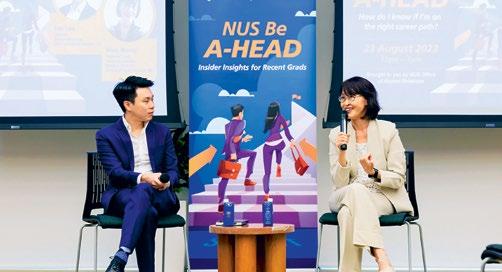
If you are interested in attending future NUS Be A-HEAD seminars, please scan this QR code to check our programme calendar.

OCT—DEC 2020 11
When it comes to my career choices, I’m very calculated, never brash. I always think about the long term. Mr Ian Lau
Above: Mr Lau, together with Ms May Wong (Arts and Social Sciences '90), Regional Lead, Talent Acquisition, Barclays Bank, speaking at the NUS Be A-HEAD career seminar.
OCT—DEC 2023
READY TO SHAPE TOMORROW
NUS Commencement celebrates graduates who have embraced challenges, undergone a transformation and are now equipped to weave their aspirations into the fabric of society.
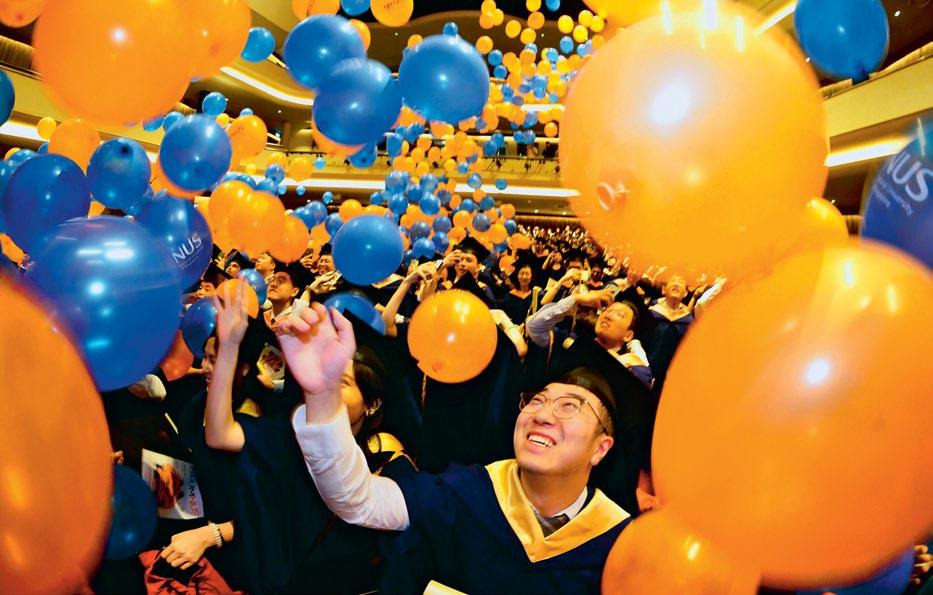 TEXT BY AUDRINA GAN
TEXT BY AUDRINA GAN
AMIDST AN ATMOSPHERE OF JUBILATION AND ACHIEVEMENT, THE COMMENCEMENT

CEREMONIES at the National University of Singapore (NUS) kicked off at the University Cultural Centre this year as the graduates’ families and friends gathered to celebrate the occasion.
The Main Ceremony, the first of 30 to be held from 6 to 15 July, honoured 347 graduates from the Lee Kuan Yew School of Public Policy, Saw Swee Hock School of Public Health and Yong Siew Toh Conservatory of Music. With the then-NUS Chancellor and President of Singapore, Madam Halimah Yacob (Law ’78), presiding, the event was made even more special by the conferral of honorary degrees on Dr Tony Tan Keng Yam (Science ’62) and Dr Margaret Chan Fung Fu-chu (Medicine ’85).
Held over nine days, the ceremonies celebrated more than 14,700 graduates who had embarked on a fruitful journey at the University. NUS President Professor Tan Eng Chye (Science ’85) spoke about Commencement as a unique occasion that unites generations of the NUS community, all committed to that same spirit of resolve, imagination and care for the community while taking society to new heights. “I am confident that our graduates have the skills, knowledge and training, and possess the qualities of grit, drive
and determination, to thrive in the complex times ahead. In the fullness of time, you will, no doubt, make your own unique and transformative contributions to society and the world,” he said.
GRADUATES DEMONSTRATE RESILIENCE
Graduates were commended for their unwavering resilience in overcoming obstacles during their academic journey, emerging stronger and more determined. Just ask Ms Anastasia Sabrina Zuraimi (Arts and Social Sciences ’23), who majored in Political Science and minored in Malay Studies. Initially unsure she would graduate due to struggles
with her studies and wellbeing, she credits NUS for providing her “with a safe space to experience failure and improve my mental health”. Reflecting on the impact of the COVID-19 Circuit Breaker on her life, the 24-year-old shared, "Learning that it’s okay to fail was not easy... but the world turns." Her supportive family and standout professors, like Associate Professor Luke O’Sullivan (Affiliate Alumnus ’19)
12 . THE ALUM NUS HIGHLIGHTS FROM THE ALUMNI OFFICE
and Associate Professor Bilveer Singh (Arts and Social Sciences '81), kept her grounded and fuelled her interest in both politics and the arts. Although she is undecided about her career path, she hopes to explore opportunities that combine her dual passions.
The commencement ceremony also emphasised the transformative impact of education, underlining how the graduates’ time at NUS had moulded
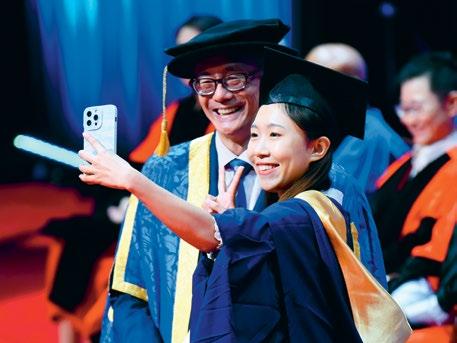

them into well-rounded individuals ready to tackle the complexities of the world.
Valedictorian Dr Alvin Tan Kian Wei (Medicine ’17), who obtained his Master of Public Policy in 2023, thanked the NUS community that has supported the graduates thus far. “Today, while we stand at the crossroads of uncertainties, we know we are not alone,” he said in his speech. “We can draw strength from the relationships and connections we have forged to weather any storm and overcome any obstacle.”
This year’s Main Ceremony was also marked by an energetic rendition of Argentine tango composer Astor Piazzolla’s 'Histoire du Tango: Bordello, 1900', which was arranged and performed by a quartet of four valedictory graduates of the Yong Siew Toh Conservatory of Music.
READY TO GIVE BACK
The season of celebration and jubilation came to a close with a night of heartwarming speeches and uplifting performances at the Commencement Dinner held on 21 July. Taking place at the dining hall of the College of Alice & Peter Tan and Residential College 4, the dinner was graced by more than 300 guests, including NUS President Prof Tan, NUS Chairman Mr Hsieh Fu Hua (Business ’74), NUS Pro-Chancellor Mr Po’ad Mattar (Accountancy ’71), valedictorians and graduates from the Class of 2023, as well as faculty, staff, students and alumni.
At the dinner, this year’s graduates paid tribute to the warm support of their professors, teachers and peers, who were an unwavering source of encouragement for the new graduates. Ms Lum Yen Yi, the NUS
BEHIND THE SCENES OF A PHOTO BOOTH SENSATION
In a mission to create a standout booth for NUS Commencement 2023, a team from the NUS Office of Alumni Relations came up with a creative solution. Led by Associate Director Ms Jacqueline Yong and joined by Senior Managers Ms Katherine Chinn and Ms Wong Sher Maine, the team turned a static backdrop into an interactive photo booth integrated with the NUS alumni magazine, The AlumNUS. “We wanted new graduates to be cover stars on The AlumNUS, creating memorable, Instagram-worthy moments for them and their families,” said Ms Yong. Despite logistical challenges and coinciding with NUS’ annual Homecoming event, the booth was a success. Over 10 days, nearly 12,000 visitors, including families, captured their memories. “The booth was a hit, bringing joy and special memories to graduates and their families,” remarked Chief Alumni Officer Ms Ovidia Lim-Rajaram (Arts and Social Sciences '89).

In the fullness of time, you will, no doubt, make your own unique and transformative contributions to society and the world.
Professor Tan Eng Chye
New graduate Ms Anastasia Sabrina Zuraimi takes a snapshot with her family at the NUS Office of Alumni Relations' photo booth.
OCT—DEC 2023 13
Students’ Union Student Deputy Welfare Secretary for Transport and Infrastructure, who graduated from the College of Design and Engineering and NUS College, shared her transformation since first setting foot on campus. “We have learnt how to deal with the implications of the pandemic, discovering many things about ourselves — our passions, our values,” she said. “Now, we have the potential to make a difference. We
IT’S A FAMILY AFFAIR
In August 2001, Dr Hsann Yin Maw (Public Health ’04) moved from Myanmar to Singapore with her nine-month-old daughter, Ms Kyi Nuu Khin Khin, to offer her a better educational future. “My husband, who’s also Burmese and is a polytechnic lecturer, told us good things about Singapore, so we came here,” says Dr Maw, now a Senior Principal Epidemiologist at a local hospital.
While pursuing her Master’s degree at the Saw Swee Hock School of Public Health, NUS, in 2003 and 2004, Dr Maw often brought her daughter to her classes. “The staff even joked that she was the youngest student,” Dr Maw says with a smile.
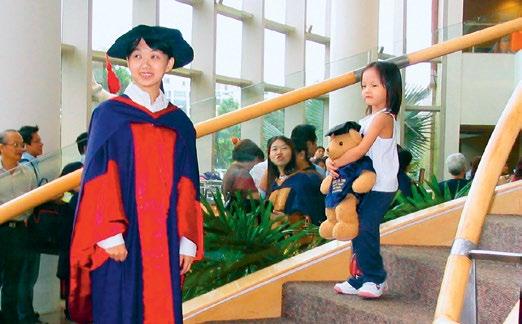
Ms Khin Khin played near the Central Medical Library, and attended the Learning Vision preschool, which was located within NUS. “I was wowed
are ready to give back to our community and society.”
Prof Tan also advised the graduates to accept change and to always stay calm and composed in evolving situations. “Some changes you will look forward to with great anticipation while others may bring the prospect of stormy weather and difficult terrain,” he said. “While it is understandable to want to avoid the stormy and difficult episodes, these may be necessary if we are to move onwards to new experiences and possibilities.” He also encouraged graduates to embrace lifelong learning, keep a curious mindset and move past their comfort zones.
Armed with the strong values and bonds they have forged during their time at NUS, graduates are prepared to step into the world and give back, embrace

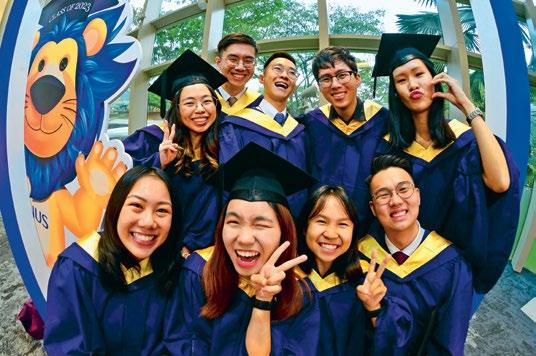
by how spacious the school was,” she recalls. Exposed to NUS culture from a young age, Ms Khin Khin (Computing ’23) opted to study at the University and graduated this year.
“Despite receiving scholarships from other universities, I chose NUS for its strong, open curriculum, and I wanted to keep my career options open,” she says. NUS not only provided an academic foundation but also taught her resilience and helped her make lifelong friends.
“I enjoyed student life and interacting with students from different courses,” Ms Khin Khin shares.
For Dr Maw, her daughter’s graduation was the culmination of a journey they had started as immigrants.
“Watching Khin Khin graduate from NUS was one of the happiest moments in my life,” says Dr Maw. “It was a personal achievement for me.”
change and fulfil their aspirations. Inspired by Professor Ho Swee Lin (Arts and Social Sciences ’89), who encouraged her to explore the unknown, Ms Leong Jia Wen (Arts and Social Sciences ’23) expressed that she was ready to take a leap of faith. “Sometimes, we’re so tied down by the prospects of our future that it hinders growth,” the 23-yearold added. “I remind myself to stand on my own feet and appreciate the present moment, not worry about an unknown future. Studying Sociology
I remind myself to appreciate the present moment, not worry about an unknown future.
Ms Leong Jia Wen
Mother and daughter, Dr Hsann Yin Maw and Ms Kyi Nuu Khin Khin, mirror their educational milestones nearly two decades apart on the same graduation staircase.
14 . THE ALUM NUS HIGHLIGHTS FROM THE ALUMNI OFFICE
has also equipped me to understand the world we live in and enrich our lives through personal experiences.”
TEEING OFF TO NEW CONNECTIONS
NUS student golfers Mr Lex Pang and Mr Emerson Boon recall their best moments at the 52nd UM-NUS Inter-University Tunku Chancellor Golf Tournament in Kuala Lumpur.

“As the only student golfers from NUS, this event was a great opportunity to connect with NUS and UM alumni,” says Mr Boon. Mr Pang adds: “It was very meaningful to be able to mingle with alumni from both schools.”

WHEN LEX PANG, 24, AND EMERSON BOON, 22, LEARNT THEY WOULD REPRESENT THE NATIONAL UNIVERSITY OF SINGAPORE (NUS) against the University of Malaya (UM) in the 52nd UM-NUS Inter-University Tunku Chancellor Golf Tournament in Kuala Lumpur, they were thrilled. The long-time golf buddies were eager to reunite after being apart due to COVID-19 and National Service.
Held for the first time in three years due to the pandemic, the competition took place on 6 and 7 June at The Mines Resort and Golf Club. The event was hosted by UM Chancellor His Royal Highness Sultan Nazrin Muizzuddin Shah, the Sultan of the state of Perak.
This year’s tournament saw 80 golfers from NUS and UM vying for the Tunku Chancellor Cup. Conceived to foster goodwill between the two universities, the tournament’s first edition took place in 1968.
THRILLS AND SKILLS
Led by golf captain Mr Bernard Toh (Architecture '84), the then-Director of the NUS Office of Alumni Relations, the NUS team included eight women among its 44 players. First-time participants Mr Boon (Year 1, Law) and Mr Pang (Year 3, Business) each won an award. Mr Boon took the Best NUS Pair title with another teammate, and Mr Pang aced the longest drive on Hole 5.
Winning required grit and some strategy. “Even though I lost my match, we spurred each other on,”
Mr Pang recalls. “We kept our focus, stuck to our strategy and reminded each other to take it one hole at a time.” Mr Boon, who has played golf competitively, believes that modest expectations often yield the best results. “In golf, you do what you can and let the ball do the rest,” he says.
Post-tournament, the young players also bonded with alumni. “During meals and drinks, they invited us to sit with them,” Mr Pang says. “It felt as though we had known each other for some time; the conversations were always light, and there were smiles all around.”
Mr Boon also made friends with three of his flight mates. “It was heartening to see so many different people brought together under the auspices of golf,” he says, adding that he particularly enjoyed playing with Tun Mohamed Raus bin Sharif, the former Chief Justice of Malaysia.
Having made new connections, both Mr Boon and Mr Pang plan to join similar tournaments as alumni and continue the cycle of friendship.
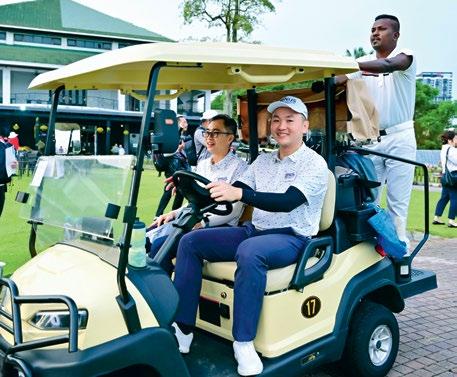
It was heartening to see so many different people brought together under the auspices of golf.
Mr Emerson Boon
Mr Lex Pang (at the wheel) won a prize for the longest drive on Hole 5 at the tournament.
Mr Emerson Boon takes a swing, later securing the Best NUS Pair title along with his teammate.
OCT—DEC 2023 15
NUS President Professor Tan Eng Chye (Science '85) and Chief Alumni Officer Ovidia Lim-Rajaram (Arts and Social Sciences '89) with alumni in between putts at The Mines Resort and Golf Club in KL.
FORGING LASTING BONDS THROUGH NUS ALUMNI GROUPS
Two new networks are showing how enduring friendships blossom and meaningful connections are made.
ALUMNI GROUPS AT THE NATIONAL UNIVERSITY OF SINGAPORE (NUS) HAVE BEEN THE CORNERSTONE for many in preserving the rich memories and relationships formed during their time as undergraduates. Beyond nostalgic reunions, these groups offer a platform for reconnecting with old friends and forging new ties through meetups and networking sessions. We look at two recently formed alumni groups that exemplify this camaraderie.
NUS ALUMNI BOARD GAMES GROUP: WHERE STRATEGY MEETS COMMUNITY
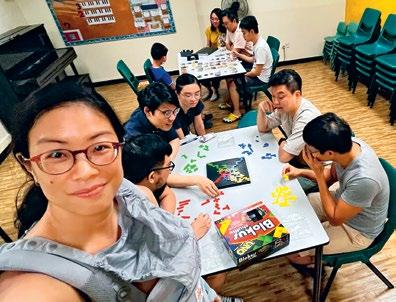
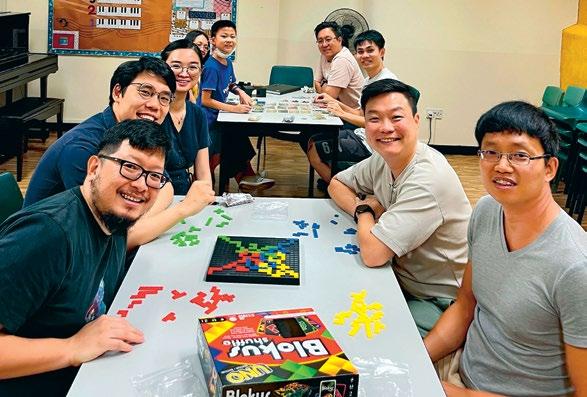

In 2019, inspired by the convivial atmosphere of board game cafes, Mr Yap Neng Giin (Computing ’08) invited his former NUS mates to his new home, aiming to recreate a similar experience. A regular board game tradition began, allowing him to introduce his friends to Ms Adeline Fam (Arts and Social Sciences ’07), whom he was dating and who shares his passion for the hobby.
Fast forward to today, and the casual get-togethers have led to more serious endeavours — Mr Yap and Ms Fam are now married and have a child together, while the meetups have evolved into an official NUS Alumni Board Games Group. The group now has more than 20 active members, who come from fields as diverse as IT, finance and healthcare. There is an equal number of men and women, many of whom introduce their partners to the experience. Meetings often involve shared meals at a committee member’s home once or twice a month, before the games begin.
From classics to modern favourites, the group’s gaming arsenal ranges from cooperative games like Pandemic to more intense ones such as Terraforming Mars. For lighter moments, Machi Koro and Herbaceous bring joy and laughter. Members are encouraged to introduce new titles.
During the COVID-19 pandemic, challenges arose. But the group leveraged online platforms like Board
Game Arena and Discord for virtual game nights every week. With the return to normalcy, the members cherish the physical meetups more than ever. For many, the sessions are not just about games. “We find playing board games therapeutic as it helps us offload things that might be weighing on our minds,” says Ms Fam, 38.
Any NUS graduate can sign up, from seasoned players to complete newbies. “You don’t have to know how to play the games as we are happy to teach you on the spot,” says Ms Fam, who is the group’s Secretary.
Looking ahead, the group hopes to grow its membership, including among older alumni. A 58-year-old joined recently so that she could introduce new games to a group of senior women. “We hope more seniors join us as we believe playing board games is a great way to age actively,” says Ms Fam. “We encourage members to bring their children too,” she adds. “Playing board games is a great way to bond, and it can help children develop critical thinking and communication skills.”
Interested alumni can join the group’s Telegram channel at t.me/+udJv9nJhCWxkMDVl to learn about upcoming sessions.
 Mr Yap (left) and Mr Ng Chee Chiu (Computing ’04) get serious at Splendour during board game night.
Ms Adeline Fam joins her husband, Mr Yap, and other group members in a spirited round of Blokus and Splendour
Mr Yap (left) and Mr Ng Chee Chiu (Computing ’04) get serious at Splendour during board game night.
Ms Adeline Fam joins her husband, Mr Yap, and other group members in a spirited round of Blokus and Splendour
16 . THE ALUM NUS HIGHLIGHTS FROM THE ALUMNI OFFICE
The NUS Alumni Board Games Group engrossed in games of Blokus and Splendour, with Mr Yap Neng Giin (left) navigating his moves at the Blokus table.
COLLEGE OF ALICE & PETER TAN ALUMNI GROUP: RECONNECTION IN A POST-PANDEMIC WORLD
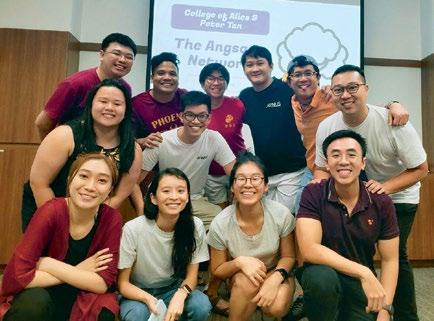
During his time at NUS, Mr Triston Pang (Computing ’21) found his time at the College of Alice & Peter Tan (CAPT) particularly enriching. Wanting a deeper understanding of diverse groups in society for his software projects, he had enrolled in a two-year supplementary programme at the College, where he gleaned insights into the lives and experiences of
various communities in Singapore, including foreign domestic workers, migrant workers and people with hearing disabilities.
For Mr Pang and many others, the experience was more than just an educational journey; it was a transformative experience.


“Our time at CAPT was a defining moment, and we made a lot of lifelong friends,” the 27-year-old software engineer recalls. “It was a bit of a shame that it was only a two-year programme. We also saw that a lot of alumni did not really keep in touch after graduation.”
That disconnect became even more pronounced during the COVID-19 pandemic. So, earlier this year, Mr Pang rallied some friends to bridge this gap, and co-founded a network that would reconnect CAPT alumni called the NUS Alumni College of Alice & Peter Tan Group - The Angsana Network. The goal is to foster new interactions among CAPT graduates, allowing
them to socialise and rekindle old friendships. With this in mind, the group hopes to revive the essence of CAPT life. It envisions hosting seminars with guest speakers sharing about their field. Mr Pang also has plans to organise career talks, hackathons and even a weekend staycation at NUS hostels to relive the good old days.
Aiming to hold quarterly events, the group organised its first one — a hike to Sentosa — in March this year for about 20 members. A heavy downpour did not dampen their enthusiasm. Instead of ending with a picnic at Siloso Beach, the group took shelter at the Merlion Cable Car Station. What followed was hours of animated discussions, reminiscent of their CAPT days. “It really brought back the signature college experience where we’d just sit down, talk and interact with people from all walks of life and different work experiences,” says Mr Pang.
With 130 alumni from 2012 to 2023 who are keen on joining, the group’s future looks promising as it goes about ensuring that the bonds formed at CAPT continue to thrive.
Alumni who are interested to join can fill out an application form, which will soon be released
on CAPT’s official student body channels.
The NUS Alumni College of Alice & Peter Tan Group - The Angsana Network, took a rejuvenating hike to Sentosa earlier this year, cementing stronger bonds amid nature.
OCT—DEC 2023 17
Mr Triston Pang (in white T-shirt at centre) with the core planning team of the NUS Alumni College of Alice & Peter Tan GroupThe Angsana Network.
THRIVING
BEST FORM IN
TEXT BY KOH YUEN LIN
HOW DO YOU REMEMBER YOUR DAYS AT THE NATIONAL UNIVERSITY OF SINGAPORE (NUS)? For many, it was a season brimming with youthful optimism; an exciting time of intellectual exploration and self-discovery. Yet for some others, it might have been a low period of feeling uncertain about future prospects, and being anxious over performance.
Ms Tasneem Abdul Majeed (Arts and Social Sciences ’23) recalls navigating university life as a freshman. Moving to a new campus, meeting new peers and adapting to a new way of learning all increased her anxiety levels. As a member of the University Scholars Programme, Ms Abdul Majeed was also required to stay on campus during her first year of undergraduate study. Immersed in an extremely social environment, and dazzled by myriad extra-curricular activities, the selfprofessed introvert found it a challenge to set boundaries. “I felt guilty about declining invitations to floor or house bonding events. I also struggled with overcommitment,” she recalls. “My parents, who were NUS students during the 1990s, were active in various student interest groups. I was inspired to do the same and enrolled in four interest groups —
without considering the impact it would have on my mental wellbeing and academic performance.”
With high expectations of academic performance and commitments to co-curricular activities, and their own set of social dynamics — which are different from those of junior colleges or polytechnics — universities can be stressful environments. As a congregating ground for the brightest minds, a university environment presents an intense level of competitiveness on a high-calibre playing field. As one of the top universities
18 . THE ALUM NUS FOCUS
Creating — and maintaining — a safe, caring environment for the students and staff of NUS is a collective effort undertaken at all levels of the University.
in Asia, and placed eighth in the 2023 Quacquarelli Symonds World University Rankings, NUS certainly attracts the best: not just a global pool of academically-driven students vying to be accepted, but also top performers in different areas of work applying for job positions within the organisation. This means that the stressors are felt not just by students, but also by staff.
Studies from around the world, from Australia1 to the United Kingdom2, have shown an increasing proportion of members of university communities experiencing mental health issues. The social disruption caused by COVID-19 certainly took its toll. In 2022, it was reported in an National University Health System (NUHS) study that three in four NUS students were at risk of depression as a result of the pandemic. The findings echoed global reports on escalated feelings of depression among student populations who were abruptly cut off from campus community life during lockdowns — as well as similar feelings experienced by university workers. While the world might have moved on from the pandemic, a newfound awareness of mental
health issues has emerged. Mental health leave days and even counselling apps have been rolled out by employers to help staff manage their wellbeing. Some companies even offer flexi-work schedules and four-day workweeks in response to the masses’ call for better work-life balance.
Addressing the wellbeing of the working community is also a matter of economic importance. In April 2023, a study by Duke-NUS Medical School and the Institute of Mental Health found that anxiety and depression could cost Singapore around $16 billion yearly, with those affected missing an additional 17.7 days of work a year on average, and being 40 per cent less productive while at work.
Yet, initiatives and resources do not in themselves make a healthy environment. A four-day workweek on paper would be of little benefit if employees are still expected to respond to work messages and emails after office hours. The provision of ‘mental health leave days’ would lose its effect if a person still feels pressured by peers to forsake downtime for productivity. This is certainly a pertinent issue in Singapore, where the local culture still places value on visible, outward signs of industriousness, be it among working adults or the student population.
Creating a truly healthy work environment takes meaningful engagement, sustained efforts and a genuine culture of care. At NUS, these come naturally. After all, universities have more than a duty to educate — they also have a duty of care.
CARING FROM THE CORE
As a world-class organisation, NUS has been putting conscientious effort into creating and promoting
OCT—DEC 2023 19
1 blog.aare.edu.au/the-kids-arent-all-right-neither-are-staff/ 2 www.frontiersin.org/articles/10.3389/feduc.2022.929335/full
LEARNING TO HELP
a supportive and caring culture and community for both its student and working population — and this starts right from the university’s leadership core.
Some courses available for NUS staff.
Peer Staff Supporters undergo a two-day training programme. Thereafter, Peer Staff Supporters participate in sessions with a trained clinical psychologist every two months, and enjoy access to wellbeing workshops to level up on their peer supporter skills.
Mental health literacy workshops are offered monthly for all staff. These range from hour-long presentations on topics such as mindful eating to half-day sessions on suicide alertness.
Boost Your Psychological Capital is a two-day workshop curated by HWB to help individuals build resilience. Through scientifically proven positive psychology strategies, attendees learn how to handle work stressors, uncover personal strengths and bounce back from setbacks.
One of NUS’ strongest advocates for mental health is the Chairman of the NUS Board of Trustees, Mr Hsieh Fu Hua (Business ’74). Together with NUS President Professor Tan Eng Chye (Science ’85), they ensured that mental health became a strategic leadership priority within the University. They drove the formation of the NUS Health and Wellbeing (HWB) team, established under the Office of the President, in 2020. This was followed by the creation of the NUS Steering Committee on Mental Health & Wellbeing in June 2021. Chaired by the Deputy President of Administration, Mr Clarence Ti, the committee serves to provide oversight and guidance on the implementation of the University’s mental health strategy. Together, HWB and the committee look at consolidating and organising mental health resources and approaches to enhance the mental health and wellbeing of the NUS community. This is achieved via various modes, ranging from psychological clinical services, training, outreach and research to even the standardisation of measurement scales to assess the wellbeing of the NUS population. While there have been siloed wellness initiatives that predate it, the setting up of HWB demonstrates a concerted effort to drive a holistic health and wellbeing strategy. Its formation cements the University’s commitment to enhancing the mental health and wellbeing of the entire NUS community, staff and students alike. “Universities, in
general, focus on the wellbeing of students. NUS is one of the few that goes above and beyond this, and is kickstarting the journey to improve the wellbeing of academic, research, administration and executive staff,” shares Dr Andrew Epaphroditus Tay (Medicine ’05), Head and Director of the HWB team.
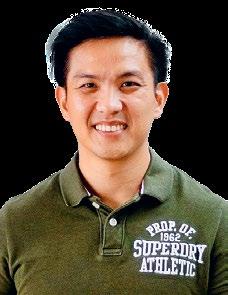
NUS has been recognised for its efforts. At the WorkWell Leaders Awards 2023, the university clinched the Wellbeing Organisation of the Year Award, while Prof Tan — who regularly invites staff from all levels to join him for casual chats during his daily morning walks — was bestowed the Wellbeing Leader Award for setting the tone and culture for building a mentally healthy workplace.
Further demonstrating their commitment to the cause, NUS senior leaders are also personally involved in two major health and wellbeing committees. These are the Mental Health Steering Committee that develops the University’s mental health strategy and ensures allocation of sufficient resources and budget; and the Healthy Campus Initiative that promotes a healthier lifestyle for the NUS population through changing eating habits and engagement in physical activities. Such involvement has contributed to regular and meaningful discussions on health and wellbeing matters at high-level meetings.
OF COUNSELLING… AND CATS
Taking a systematic approach to promoting mental health, the WellNUS framework was devised in 2021. It encourages organisations to start methodically plotting in each programme, initiative and wellbeing effort that caters to the needs of employees across the wellbeing spectrum: from a state of
20 . THE ALUM NUS FOCUS
Universities, in general, focus on the wellbeing of students. NUS is one of the few that goes above and beyond this, and is kickstarting the journey to improve the wellbeing of academic, research, administration and executive staff.
Dr Andrew Epaphroditus Tay, Head and Director of the NUS Health & Wellbeing team
wellness to be maintained, and states that could be better managed through intervention and support, to recovery and back-to-work transition stages. This framework also serves as a gap analysis tool to identify areas for improvement and key stakeholders in charge of implementing change.
Dr Tay highlights that the framework is designed to ensure accountability in three areas: Culture and Leadership; Systems and Infrastructure; and Support Services and Resources. With this tool, NUS has been able to review organisation-wide programmes — a complementary package of long-term initiatives and ad hoc activations — to minimise duplication of efforts across stakeholders. “This has resulted in a much more unified, holistic, structured and sustainable approach to supporting employee wellbeing,” shares Dr Tay.
This translates to a 360-strategy, executed with high levels of professionalism. Tapping into the
University’s in-house experts, Wellbeing Specialist Partners (WBSP) is a clinical arm that provides staff with evidencebased psychological services spanning counselling, free internal psychological support from a dedicated team of inhouse NUS clinical psychologists, and group therapy. Based on their individual comfort level, staff also have the option of consulting with staff within the campus community, or seeking support through NUS' external vendor.
HWB also encourages staff to maintain and manage their wellbeing through additional forms of support and tools that help to build resilience.
The latest iteration of NUSHeart (Help Employees with Advice, Resources & Therapy) — an Employee Assistance Programme by the NUS Office of Human Resources, and supported by HWB — is a perfect example of this approach. As of April 2023, the updated NUSHeart has contracted an external vendor to provide an
engaging mobile app that covers a wide range of uses. Built into the app are personalised self-care and skill-building programmes, alongside a wealth of bite-sized wellness tips that make it an informative tool for everyday use. It also features functions such as booking faceto-face and virtual counselling appointments, alongside coaching sessions, helping to make periodic wellness check-ins hassle-free.
The NUSHeart app also demonstrates an effort taken to make information and resources as accessible as possible — a critical factor in the effectiveness of any programme. HWB’s mental health destigmatisation campaign was thus launched. Now into its third year and known as the (kind)mind campaign, it drives resource awareness and sets the tone for a culture of psychological safety and empathy on campus. This is done through panel discussions — with speakers including NUS alumni, senior leadership, students and staff — workshops and even a campus-wide digital game with prizes to be won.
Based on NUS’ 2022 Wellbeing Survey, the effect of the annual outreach campaign has seen an almost five-fold increase in the number of requests to utilise counselling services. The survey showed that — compared to those unaware of the campaign — staff and students who have been exposed to the campaign messages are increasingly willing to support people with a mental health issue. They also cited lower levels of distress and are more favourable towards using mental health resources and services. Since the destigmatisation campaign’s launch in 2021, there has been a decreasing trend in staff reporting extremely severe (from 4 to 3.79 per cent) and severe (8.3 to 6.9 per cent) signs of distress.
OCT—DEC 2023 21
While campaigns are highly visible and attention-grabbing, normalising conversations on wellbeing takes constant effort, and multiple events have been organised to engage the campus population all year round, through different entry points. Not about to book a counselling session? How about a complimentary and confidential Health and Wellbeing Check-in to talk about what’s on your mind? If that’s not within your comfort zone, then consider an invigorating round of yoga to learn about ergonomic health instead. Or a “Paws-itive Mood Booster” session cuddling with felines and canines from Animal-Assisted Interactions Singapore while gaining actionable wellness take-aways. This year, HWB even collaborated with the Society for the Prevention of Cruelty to Animals (SPCA) for mindfulness and stretching sessions — while interacting with cats and kittens. While the main focus was on mindfulness and physical wellbeing, HWB also took the chance to get the SPCA to raise awareness about responsible pet ownership as a bonus.
Another initiative is the NUS Wellbeing Day. Launched in 2021
as an annual day-off for the whole campus to shut down to recharge as a community, it is now a twice-a-year event that sees staff and students getting that extra time away from school and work. “The idea behind NUS Wellbeing Day is that employees tend to shut down much better when they are doing it collectively," shares Dr Tay. "The impact of the NUS Wellbeing Days were huge, with data showing that employees were able to rest more than two times more effectively, compared to vacation days and weekends. This has been demonstrated by the precipitous drop of individual electronic traffic during NUS Wellbeing Days."
BETTER TOGETHER
HWB collaborated with SPCA to organise a mindfulness breathing and stretching session with cats.

For those ready to deep-dive into mental health issues — not just for their own benefit, but also to help others — NUS offers a full spectrum of education and training programmes. These range from hour-long awareness workshops held monthly, to two-
day programmes for Peer Staff Supporters (PSS) Training.
The PSS system gives NUS staff with a passion for helping others the relevant training to help keep a lookout for colleagues in distress and offers them basic emotional support. PSS members also play the role of directing colleagues to the appropriate services and resources. A similar scheme — the PSS system by the Office of Student Affairs (OSA) — is mirrored for the student body.
Mr John Chng, Senior Associate Director, Student Wellness unit, OSA, shares the importance of having these “wellness agents” on the ground. “Through surveys, we have found that the first people a person in distress turns to are often their peers,” he reveals. “While there is much more mental health awareness today, there is still stigma among local and international students,
22 . THE ALUM NUS FOCUS
who might have been brought up thinking that having such issues is a sign of weakness or even a matter of bringing shame to the family.” While neither counsellors nor mental health professionals, peer supporters play that first line of defence in safeguarding the wellbeing of the NUS community, simply by being that friend-next-door, or colleague that one can turn to. “We take mental wellness literacy training in students very seriously, and have been implementing such programmes since 2019,” says Mr Chng, who also shares that more than 700 students go through various forms of training each year to learn how to recognise distress signs among peers.
Ms Abdul Majeed was a Peer Student Supporter from 2022 to 2023. She says, “We underwent a rigorous six-month training programme on
counselling techniques, peer support and crisis management to ensure that we were well-equipped to support students in distress. We were also well-supported by a team of experienced OSA staff, who helped address any concerns we had and made sure we had time for self-care to better support the student community.”
Besides the PSS initiative, there is also a full suite of health and wellbeing services and programmes aimed at the student population. University Counselling Services (UCS) under HWB ensures that students in distress have easy access to professional mental health support. In view of the students’ busy schedules, UCS even runs office hours sessions, and has streamlined services to the effect of reducing the waiting time for the
first appointment by 60 per cent — so that help can be delivered sooner to those who need it.
A Year 3 Business NUS student, who declined to be named, visited UCS in October last year. He was searching for NUS counselling services online, chanced upon UCS and booked an appointment. “I had a 1-to-1 consultation with a counsellor for about an hour and it was very helpful," he says. "The counsellor was professional and reassuring. They even checked in with me a month after my appointment to make sure I was okay, and told me that I could always visit them again if I had any concerns.”
Also part of the support infrastructure are Faculty Student Support Managers (SSMs). Since 2017, some 40 to 50 SSMs who are trained to provide social and emotional support to students have been appointed. “They serve as a port of call for students who are facing mental health issues and could help to facilitate certain academic arrangements, such as the pushing back of deadlines or reducing workloads by delaying modules,” explains Mr Chng.
As of 2019, NUS has also appointed trained counsellors and social workers as Student Wellness Managers (SWMs) on campus and Residential Wellness Managers
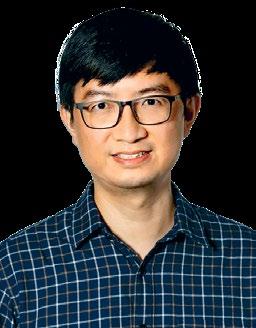

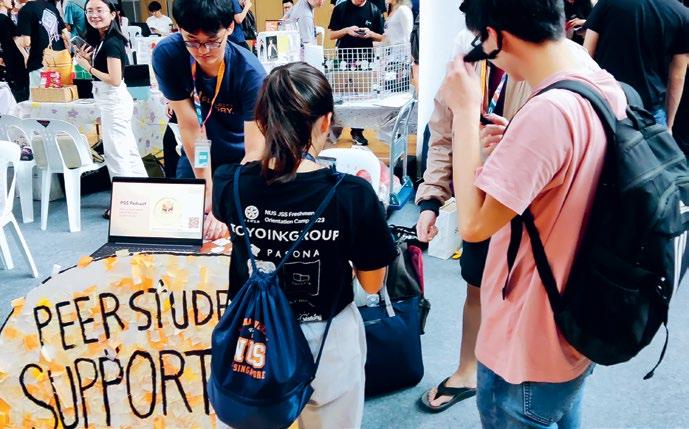 The latest batch of Peer Student Supporters at the PSS Induction 2023. Peer Student Supporters at a booth at the Student Life Fair 2023.
The latest batch of Peer Student Supporters at the PSS Induction 2023. Peer Student Supporters at a booth at the Student Life Fair 2023.
OCT—DEC 2023 23
While there is more mental health awareness today, there is still stigma among local and international students, who might have been brought up thinking that having such issues is a sign of weakness or even a matter of bringing shame to the family.
Mr John Chng, Senior Associate Director, Student Wellness unit, NUS Office of Student Affairs
(RWMs) in hostels from mid-2022. SWMs complement SSMs in identifying students at risk, and connect them to appropriate services such as UCS for further assistance if needed. “Whether it be relationship problems or mental health conditions, students from faculties and hostels are appreciative of the help and support rendered by the Wellness Managers,” says Mr Chng.
The Wellness Managers are positioned close to student life to build trusting relationships and to
“brand mental health as something approachable and accessible,” shares Mr Chng. “While we are all trained counsellors and social workers, we do not take our interactions with students as a ‘counselling’ session. We are just there as somebody who they can talk to, and we kind of do an initial assessment. If a student presents severe symptoms, we try to build a relationship with them in the hope that we might be able to encourage them to go for the University’s professional counselling services.”
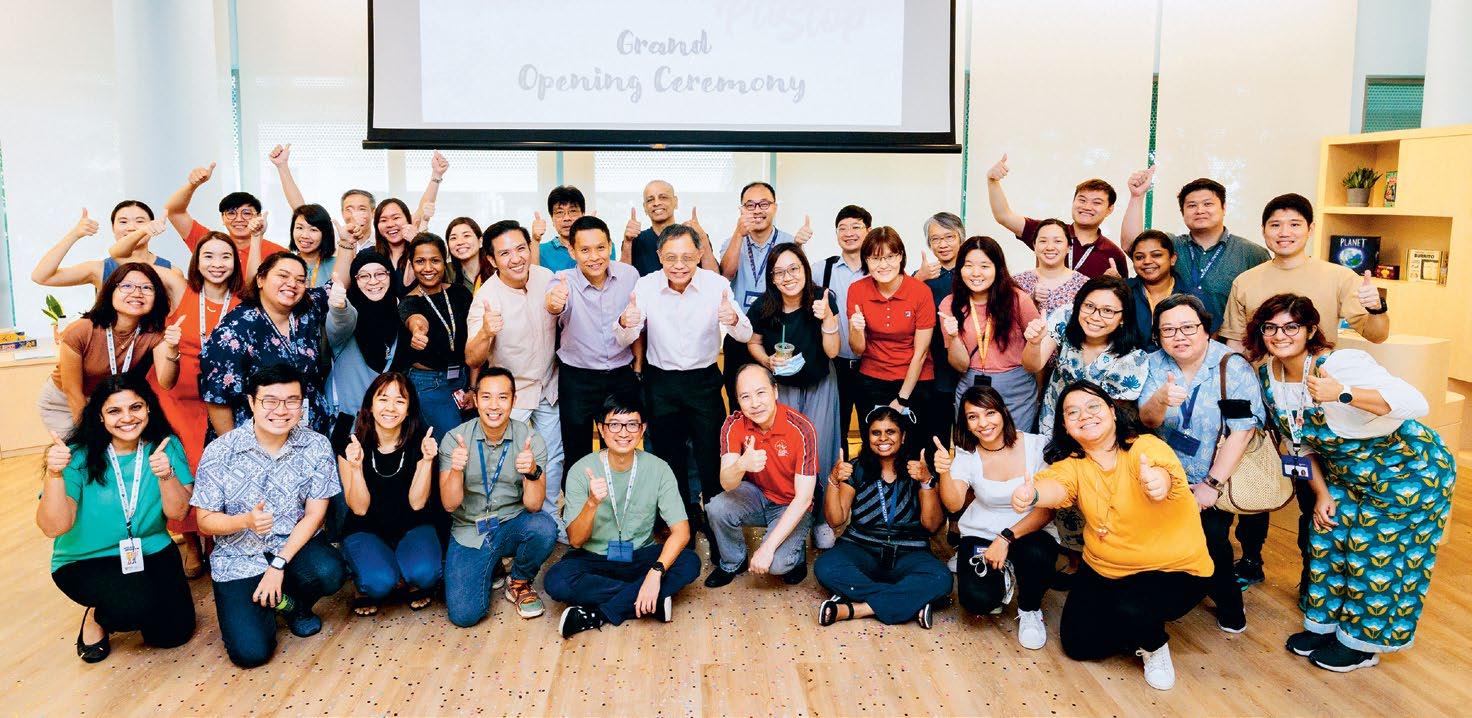
Moving beyond providing students with essential services, the Student Wellness unit takes things upstream with the WellNUS Festival, co-organised with the University Health Centre and in partnership with HWB. First launched in 2020, this month-long event held in conjunction with World Mental Health Day on 10 October is a campus-wide activation packed with interest-based activities and informative virtual talks. “For that whole month, we would collaborate with student clubs and faculties alike to conduct activities such as kayaking,
music box making, and latte art. The focus, however, is on wellness,” details Mr Chng. “Many students do know the importance of mental health as part of the whole NUS journey. However, we want to encourage them to prioritise their mental wellbeing, rather than start thinking about it only when they face issues.” These craft workshops and fitness sessions are a reminder for them to engage in activities that can help them reset and recalibrate body and mind.
Kenric Tan (Year 4, Nursing) participated in the WellNUS Festival last year. He says, “It was an opportunity to explore crafts and practices that I had never tried before and take a short break from school to recharge!” He also believes in OSA’s “7 PitStop Principles” — Personal Skills, Interactions, Time Out, Sleep, Thoughtful Eating, On the Move and Purpose — positive practices that students can adopt to help with stress management and improve self-care. “I would encourage [my friends] to practice the Pitstop Principles or to even regularly share their thoughts
24 . THE ALUM NUS FOCUS
Many students do know the importance of mental health as part of the whole NUS journey. However, we want to encourage them to prioritise their mental wellbeing, rather than start thinking about it only when they face issues.
Mr John Chng, Senior Associate Director, Student Wellness unit, NUS Office of Student Affairs
Staff at the opening of PitStop@UTown.
and feelings so they will not be bottled up," he adds.
Ms Abdul Majeed adds that wellness reminders were apparent throughout the NUS campus. “Taking the campus bus, I would pass banners advertising the University's free counselling services and events promoting mental wellness on campus such as mindfulness workshops.”
BEYOND HAPPINESS — HELPING STUDENTS BUILD RESILIENCE
It’s not just all good vibes and sunshine though. Pointing to “happiness rankings” among universities, which one might find
online, Mr Chng stresses that a “happy” student body doesn’t necessarily translate to wellness. “Wellbeing is a lot of things, from a sense of belonging and feeling of security, to being appreciated. It is not just about staying happy all the time,” he opines. While some might argue that a more relaxed teaching structure — as opposed to an intensely rigorous education system — could significantly reduce the stress students experience, Mr Chng differs. “Indeed, a competitive culture can have an impact on our students’ wellbeing, to the point where they might be unable to perform at their optimal level. However, academic excellence and wellness are not at opposite ends.” Having spoken with peers from top universities such as Oxford and King’s College, he found that the more highly-ranked a university is, the stronger the support structure for students who are distressed. “More importantly, it’s also about having the mental resilience to pick oneself up after failure, or a period of feeling down,” says Mr Chng. He opines that
what is more critical is a university environment that allows students to flourish in their own way by allowing them to fail, and by celebrating different successes.
Mr Chng’s sentiments echo what Prof Tan shared in a July 2023 interview with Channel NewsAsia3 : “We feel that in a university, we should allow our students to experience failure, hopefully in a more controlled environment… and they learn from it, pick themselves up, and continue to push forward.”
The flagship NUS Overseas Colleges programme alongside internships all serve to expose students to
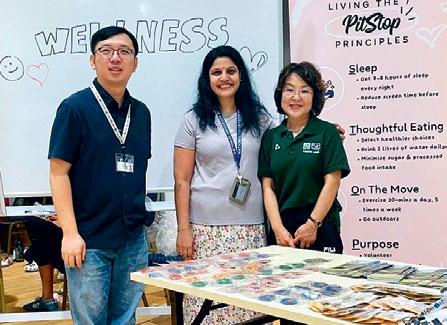
LIVING IT. LOVING IT. Creating a vibrant campus experience for better health and wellbeing.
invited to relax and chat with peer supporters and Student Wellness Managers on duty. “We market PitStop as a friendly place where anybody can go just to destress,” says Mr Chng.
Chatting Pods at PitStop. PITSTOP
Decked with massage chairs and foosball tables, and kitted with boardgames, these public areas located at UTown, and within the Science, College of Design and Engineering, Dentistry and Law faculties, are dedicated to student mental wellness. Here, students are
“Apart from gyms and running tracks for working out, students appreciate this pocket of recreational space where they can talk about wellbeing.”
NUS STUDENTS’ SPORTS CLUB
This club caters to the recreational needs of students through its 18 member clubs spanning
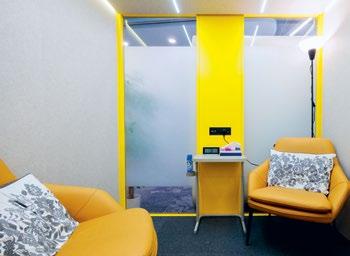
martial arts, water, land and indoor sports. Through Sports Club projects such as NUS Biathlon, SunNUS, NUS Sports Camp, RunNUS and Inter-Faculty Games, it further promotes a healthier lifestyle campus-wide, and allows the NUS population to enrich their university experience with an array of sporting activities.
CENTRE FOR THE ARTS (CFA)
Committed to enriching student life by creating a vibrant, inclusive space for experiencing the arts, CFA has overseen key arts activities on campus — from festivals and carnivals, to the ExxonMobil Campus
3 www.channelnewsasia.com/listen/work-it/leaders-chair-nus-president-tan-eng-chyeuniversity-rankings-and-morning-walks-staff-3665686
Concerts, film screenings, live music performances and even improv theatre acts — since 1986.
CENTRE FOR MUSIC AND HEALTH (CMH)
Established by NUS Yong Siew Toh Conservatory of Music and launched in 2023 to advance the use of music for health and wellbeing, CMH is the first of its kind in Southeast Asia. While primarily a research centre, CMH has also organised events such as Movin’ & Groovin’ for Wellness, a music and dance programme held in June 2023 in collaboration with National Gallery Singapore, to promote wellness and creative expression.
OCT—DEC 2023 25
Residential Wellness Manager Orientation 2023.
experiential routes of learning outside of the classroom. “They might see the startup (that they are attached to) doing extremely well in the first half of the year, and in the second half, see it collapse," adds Mr Chng. "It makes them think about how things might be if they were actually working there, and suddenly found themselves without a job.” Witnessing and going through such real-world failures can help students mentally steel themselves against such experiences in the future.
A KINDER EXPERIENCE FOR ALL

Mr Chng shares that the 2023 Student Life survey showed that rates of anxiety, depression and perceived stress have fallen as compared to the years before, indicating that mental wellbeing is better among the student population. “There are a lot of factors that contribute to this — one of it being the resumption of
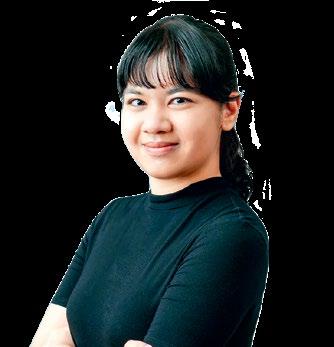
face-to-face sessions post-pandemic, leading to positive social interactions,” he shares. “I like to think that our proactive approach in reaching out has also helped.”
Apart from university-directed efforts, there are also ground-up movements with considerable impact. Under the Healthy Campus Initiative (HCI) administered by HWB, undergraduates can apply for funding and mentorship for health and wellbeing projects. Mr Chng also shines the spotlight on projects such as Spectrum, a student-led mental health movement that centres on the belief that mental health falls on a continuum, which won the 2020 NUS Public Health Challenge. This competition invites NUS students across faculties to propose ground-up solutions that can improve the health of the NUS community. Other initiatives have even attracted the attention of those beyond NUS. One example
is I am Friendly Co, an anonymous platform where any youth or young adult can seek emotional support from trained listeners, which was started by NUS undergraduates. The platform is supported by NUS Enterprise and the People’s Association Youth Movement, among other organisations.
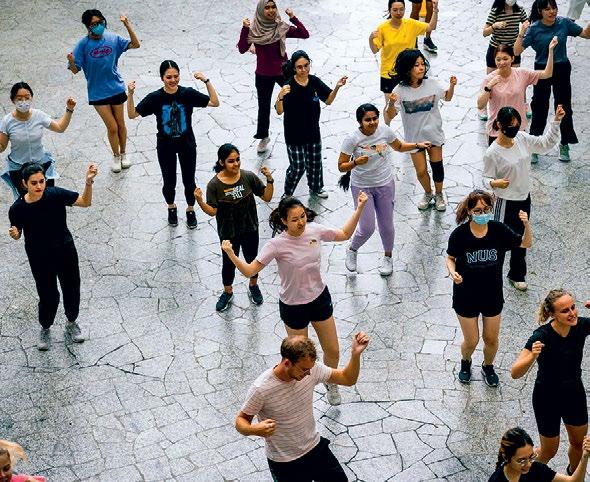
Beyond these headline-grabbing projects, there are also myriad student groups — be it mental health advocacy groups within hostels, or student committees — coming together to create awareness events. At the end of the day, just as managing and maintaining one’s physical and mental wellbeing lies on a continuum, so does NUS’ journey in building a healthy and kind campus community. “NUS is a large community with a long legacy — it will take time to change the mindset and culture university-wide, inside out,” says Dr Tay. “However the NUS community has been openminded and many have embraced change. As a whole university, we are working together to make bigger strides for a more supportive and caring environment.”

26 . THE ALUM NUS FOCUS
Taking the campus bus, I would pass banners advertising the University's free counselling services and events promoting mental wellness on campus such as mindfulness workshops.
Ms Tasneem Abdul Majeed (Arts and Social Sciences ’23)
Activities at the WellNUS Festival included a fitness class and a relaxing session to craft a musical box.
print issues per year!


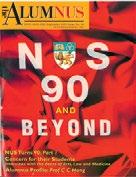
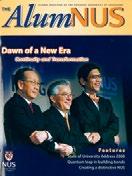





In line with sustainable practices, we are moving more into the digital space. From four issues per year, we will become a bi-annual print publication. Your next issue of The AlumNUS will land in June 2024.





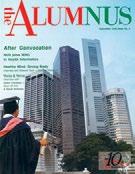
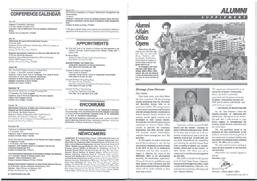
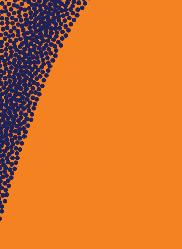











In the meantime, we’ll continue to roll out more great content online at nus.edu.sg/alumnet/thealumnus so do keep visiting our site!




























GOING STRONG SINCE 1989


BEING THE PILLAR TO SUPPORT THE PRESSURE
In their relentless pursuit of ‘making the grade’, many children and teenagers end up grappling with mental and emotional stress. Here’s what parents can do to ease their burden.
TEXT BY DR VIVIENNE NG AND MS SOPHIE CHENG
XAMINATION
AND SOCIAL
EPRESSURES CHILDREN IN SINGAPORE FACE ARE VERY REAL. National examinations such as the PSLE, and ‘O’ and ‘A’ levels, have seen one too many children succumbing to the mental and emotional pressure, some with severe consequences. Socially — and especially on the school front and social media — the pressures of fitting in, measuring up and exceeding expectations are equally significant, if not stronger, as children grow into teenagers. However, as concerned adults and carers, you do not need to despair as there are a plethora of ways you can offer concrete support and help.
ACCEPT AND BELIEVE THE CHILD’S EXPERIENCE OF PRESSURE AS REAL
It helps the child when you come to them demonstrating that you believe and accept their struggles as something that is real and pressing.
Playing it down or sidestepping discussions about their stress does not help.
According to Erikson’s psychosocial model of development, children from the ages of seven to 18 experience two overarching challenges: industry vs inferiority, as well as identity vs confusion. Children innately want to handle social and academic demands well, and failing to do so results in their sense of inferiority. They explore their independence and sense of self in the teenage years. Not navigating this stage well can lead to insecurity and confusion about who they are and their future. Empower the child by taking their issues seriously, listen to their setbacks without judgement, and affirm their strengths and abilities.
MANAGE STRESS AND LEARNING
We already have a barrage of information on how to deal with studying and keeping stress at bay. Keeping a routine, setting feasible and
measurable goals, staying healthy, sleeping well, having structured rewards systems, practising mindfulness, having friends, drawing mind maps, the list goes on.
When I (Sophie) was growing up, I realised my mother took very different approaches to supporting my siblings and me. When I failed to anticipate my mother’s reactions based on how she had previously responded to my siblings, I sometimes wondered if she was experimenting with us! In retrospect, perhaps she understood that every child is unique and one size does not fit all.
Some children need a very strong structure to help them keep a routine, while others need more autonomy. In fact, the same child may need different sorts of encouragements at different times of the day, be it a kind word, an attentive listening ear, or a small snack at the right time. These can do wonders. Stand in the
28 . THE ALUM NUS panorama
child’s shoes and communicate gently to know what works best. Do what you can, within your unique circumstances, to provide that support and be flexible.
CREATE SPACE AND CLOSENESS AT THE SAME TIME
Sometimes, in a bid to support the child, well-intentioned parents or carers may unconsciously become too caught up in the study and social stress facing the child. Providing inappropriate or overly intense support for a child who is already stressed can contribute to a strained parent/carer-child relationship which can in itself be an unnecessary stressor for both the adult and child.
Allowing appropriate space for the relationship to not be just about stress, studies and other social pressures can reap longer-term benefits. Consider outsourcing some tasks that can be overwhelming for you and which tend to cause friction between you and the child. This may be prioritising activities
that serve to enhance your bond, or enlisting the help of family, friends and professionals (e.g. getting a coach). You are seen as supportive after your child experiences you as being on the same side. Do not forget that you and the child are two separate individuals with different needs and life journeys. Enjoy the closeness and separateness of the relationship as you become a supportive witness of your child’s growth and achievements.
SECURE YOURSELF
Perhaps you are reading this because you think that your child can thrive better with your efforts to become a better parent/carer. If that is so, perhaps the following can help you find some rest in your pursuit to becoming a perfect parent/carer.
In English paediatrician
Dr Donald Winnicott’s seminal work1 , he described a carer as being “good enough”. The concept states that a child has innumerable needs and a carer may not be able to meet all of those needs. However, a child does not need a perfect carer. A child can thrive with good enough support, as the child can adapt accordingly. A similar concept is resilience, where, by allowing ourselves to experience and learn from failures, we gain more in life.
In today’s busy ‘hustle culture’, there can be an endless list of to-dos to ensure our success. At times, parents and carers may feel guilty and disappointed for not meeting their child’s every need. Remember
that your child is learning from your security and responses. If you are very anxious about your child’s performance, you are more likely to ask anxious questions and your child can pick up the tension in you. However, if you are confident and secure, your child can pick up that confidence and draw from your stability. It is not easy to stay stable, secure and calm, given that many things in a child’s life today can seem at high-stakes — and it is very easy to spiral into thinking that a bad grade in one exam, or one bullying incident, can scar your child forever.
When you notice yourself feeling the stress, it is important then to first find your inner peace. Doing some deep-breathing exercises (e.g. box breathing) and keeping a healthy lifestyle may be helpful in keeping you grounded and secure so that your child can be influenced by and grow through your security.
OCT—DEC 2023 29
Do not forget that you and the child are two separate individuals with different needs and life journeys. Enjoy the closeness and separateness of the relationship as you become a supportive witness of your child’s growth and achievements.
Dr Vivienne Ng (Arts and Social Sciences ’98) is a Post-doctoral Fellow and Ms Sophie Cheng (Arts and Social Sciences ’04) is an Instructor. They are both with the NUS Department of Social Work. 1 Winnicott, D. W. (2018). Transitional objects and transitional phenomena 1—a study of the first not-me possession 2. In Influential Papers from the 1950s (pp. 202-221). Routledge.
WHO HE IS
Entrepreneurship has been a lifelong passion for Mr Bjorn Lee. A chance to participate in the NUS Overseas Colleges programme inspired his decision to study Business at the University, instead of his parents’ suggestion for him to pursue law. Early in his career, Mr Lee had a brush with poor mental wellbeing that eventually led him to start MindFi in 2017.
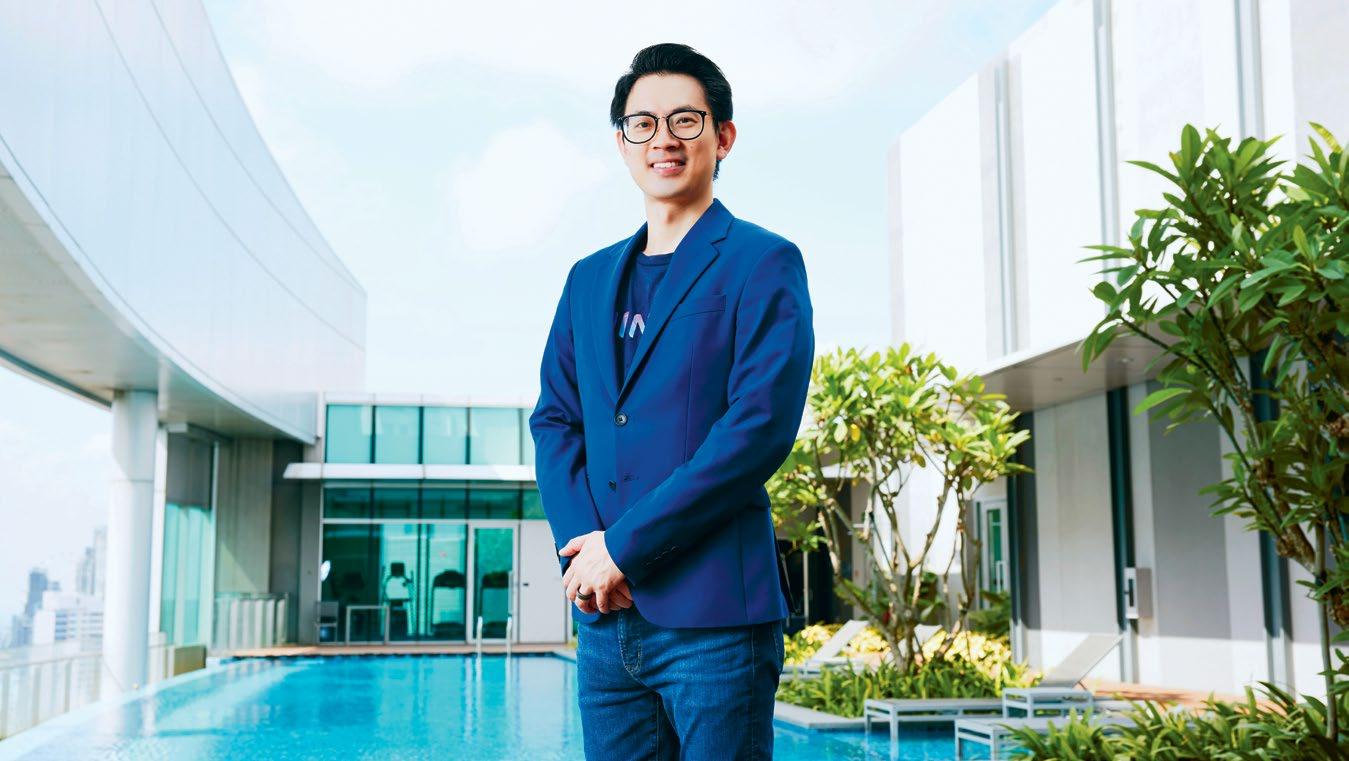
Mind Your Business
OR A SENSE OF HOW MENTAL
HAS BECOME
IMPORTANT IN THE CORPORATE WORLD, look no further than the expansion of MindFi, a homegrown startup that began with five employees. Their numbers have since swelled to 30, shares its co-founder, Mr Bjorn Lee. There has also been steady interest in the MindFi app, which was launched in 2021 to provide access to virtual counselling
and coaching, self-care content and exercises, and personal well-being tracking. “Before the pandemic, companies had little budget for their employees’ mental health, and mental health wasn’t openly discussed,” he recalls. But three years of lockdowns and social distancing mandates took their toll, and both individuals and organisations started looking for tools to safeguard their mental health. Enter MindFi — the name stands for “mind fitness” and is also a play on the ubiquity of Wi-Fi. This ideal is something that Mr Lee hopes to bring to the community. “MindFi is targeted at businesses and organisations because the workplace really is the frontline of stress and I hope we can tackle that through our app,” shares Mr Lee, 42.
A GROWING FOOTPRINT
On this front, MindFi has secured corporate clients including Deutsche Bank, KPMG and Funding Societies, supporting some 100,000 employees across 35 countries in Asia Pacific. Its users are spread across countries in the Asia-Pacific region, including Singapore, Hong Kong and Australia, with services offered in 16 languages. In addition to personalised programmes, users can access masterclasses on various wellbeing topics, such as ‘Happiness Starts With Good Mental Health’ and ‘Mental Health First Aid For Leaders’. Human resource professionals can also use the app’s analytics to gain actionable insights and refine the delivery of their wellbeing programmes.
Mr Lee, who has faced his own mental health struggles, is proud of the impact MindFi is making. “I was heartened to hear from a senior vice-
30 . THE ALUM NUS pursuit of excellence
Mr Bjorn Lee (Business ’06) uses AI to champion mental wellbeing at the workplace.
FWELLBEING
INCREASINGLY
MINDFUL MILESTONES
2006
Graduates from NUS with a degree in business.
2010
Starts Stickery — an edtech company funded by Google Ventures — which is eventually acquired in 2013.
2011
The stress of running an early-stage startup sparks a journey into self-care; Mr Lee travels to India for a 10-day meditation retreat.
2013
Takes on a twoyear stint in product innovation and management at Zopim, a startup that is acquired by award-winning customer service company Zendesk.
2016
Goes on a six-month sabbatical through Europe, where he spends time learning coding and speaking with psychologists and psychiatrists about the state of mental health in the modern world.
2017
Starts MindFi.
2019
Begins a part-time role as an entrepreneurin-residence at WeWork, helping early-stage startups in product management, marketing, culture and wellness.
president at a top tech company who told me the app helped him manage stress, especially during meetings,” he shares.
“He was most appreciative of our haptic breathing feature, where you breathe [in sync with your] phone’s vibrations. He regularly uses this feature during meetings to regulate his blood pressure.”
These anecdotes underscore what Mr Lee hopes to achieve through MindFi.
“I want to reconcile the ambition of business with calmness and wellbeing,” he emphasises. “It can be done.”
THE NEXT LAP
If you had asked Mr Lee more than a decade ago whether an alignment of corporate and wellness goals was possible, his response would have been different. Back then, he founded an education technology startup based in Silicon Valley, but the experience was vastly different. “I was working 80- to 100-hour weeks for almost a year, with poor sleep and no exercise,” Mr Lee shares.
“The stress eventually got to me and I started feeling chest pains.” Initially fearing a heart attack, he consulted a doctor, who identified his symptoms as the tell-tale signs of stress. “He advised me to seek psychological help at the Institute of Mental Health, but (due to the stigma), I asked for other options,” Mr Lee reveals.
The doctor then introduced Mr Lee to meditation. “Funnily enough, my father was an ardent practitioner of meditation, although his practice was deeply linked to religion, which didn’t appeal to me. But my doctor told me to give it a try.” Six months later, Mr Lee went on a silent retreat in India to learn traditional meditation. He continues to meditate daily for 10 to 30 minutes each time.
ADAPTING FOR TODAY
Mr Lee understands that not everyone can commit to long meditation sessions as attention spans are short and time is limited. Recognising this, some MindFi meditation sessions are just a minute long. “We want to get people into the habit
of meditating or being mindful, which is why we start with short sessions.”
One of MindFi’s strengths lies in its use of cutting-edge technology. The app boasts an AI algorithm that tailors recommendations to each user’s unique profile, taking into account factors like activity level, sleep, mood and heart rate. Mr Lee credits his co-founders — Chief Growth Officer Mr Leon Leong (Computing ’06), Chief Technology Officer Mr Gangeshwar Krishnamurthy, a former research engineer at A*STAR, and Chief Wellbeing Officer Ms Anita Sadasivan — for these innovations. Through their collective efforts, the four of them are amassing a library of mental health profiles that can train AI models for more accurate and personalised recommendations.
Investors have taken note. Last year, MindFi announced a successful $2 million seed funding round, attracting backers such as Y Combinator, iGlobe, M Venture Partners and Global Founders Capital. Angel investors include Carousell co-founder Mr Marcus Tan (Business ‘11), Carro executive Mr Kenji Narushima and Spin co-founder Mr Derrick Ko.
While encouraged by MindFi’s growth, Mr Lee wants to proceed cautiously. For example, he continues to prioritise data privacy and security for the app’s users. He is also keen to provide quality care instead of merely chasing user growth. “As a company, we want to stay focused on improving lives,” he explains. “And that extends to our employees’ lives as well.” Perhaps, as they say, that’s just good business.
A senior vice-president at a top tech company told me the app helped him manage stress. He was most appreciative of our haptic breathing feature, where you breathe (in sync with your) phone’s vibrations. He uses this feature during meetings to regulate his blood pressure.
OCT—DEC 2023 31
TEXT BY ROY SIM . PHOTO BY KELVIN CHIA
WHO SHE IS
Ms Siti Adriana Muhamad Rasip is the co-founder of Empowered Families Initiative, which seeks to harness the strengths and abilities of low-income families by investing in their aspirations. The initiative took home the top honours at the inaugural =Dreams Asia Breakthrough Prize Competition, a nationwide contest of ideas to eradicate poverty.
Going Beyond Basic Needs
IFYOU EVER NEEDED AFFIRMATION THAT INTERNSHIPS CAN BE LIFE-CHANGING, just listen to the experience of Ms Siti Adriana Muhamad Rasip.
“I enrolled into my degree with the goal of becoming a policymaker. But an internship changed that,” recalls the Political Science major, now 30. The internship in question? A three-month stint at the Ministry of Social and Family Development’s Social Service Office @ Tampines, which opened her eyes to the challenges

faced by low-income families in Singapore. “I was pretty ignorant before the internship started and had many misconceptions about these families and their hardships,” she adds.
But interacting with them helped Ms Adriana see their plight in a new light. Today, she is the co-founder of Empowered Families Initiative (EFI), which invests in the aspirations of low-income communities. “Our movement calls for society to help vulnerable families thrive, instead of just survive,” she sums up. This reframing of the way we think about poverty has attracted attention from the philanthropy community. In May, a panel of judges — comprising philanthropists, academics, social entrepreneurs and policymakers — crowned EFI as the winner of the inaugural =Dreams Asia Breakthrough Prize Competition This competition offered a grand prize of $500,000 for innovative solutions to eradicate poverty in Singapore.
THE WINNING SOLUTION
EFI’s pitch is based on a simple premise: the most effective way to lift people out of poverty is by empowering families. “Social assistance in Singapore can sometimes feel reactive and
32 . THE ALUM NUS changemaker
A fresh perspective on society’s approach to poverty is essential, urges Ms Siti Adriana Muhamad Rasip (Arts and Social Sciences ’16).
POVERTY IN SINGAPORE
Public rental flats, which are synonymous with vulnerable families, are not uncommon in Singapore. At the start of the decade, some 52,000 households lived in such flats, according to estimates by the Ministry of National Development.
Efforts to uplift these communities include the Fresh Start Housing Scheme, which helps families with young children — who have previously received one housing subsidy and are currently living in public rental flats — own a 2-room Flexi flat or 3-room flat.
More than 700 households who lived in public rental flats bought homes in 2022, with some tapping the scheme.
Source: The Straits Times
Over the past 10 years, more than 7,800 rental households have bought homes, while another 2,300 households have booked units and are waiting for them to be completed.
Source: The Straits Times
designed to cover just basic needs. In such a system, families would always be ‘in need’ — they would only survive and not thrive,” she explains, adding that support measures often do not sufficiently take into account unique circumstances and challenges.
Her conversations with low-income families, which began during her time at NUS, cemented her beliefs. “A group of us — social service practitioners, and families who have lived through poverty — came together to start EFI,” she shares. In her view, the premise of EFI is that low-income communities are not just made up of people who are in need and helpless. “Many of them are creative and, for instance, want to start home-based businesses to uplift their families,” she says. “But often, the support they receive only covers their basic needs and doesn’t support these aspirations, which means these dreams get shelved.”
EFI hopes to help these families dust off their long-held dreams, which can be related to employment, entrepreneurship, skills upgrading, savings and expansion of social capital. This is not an exhaustive list, adds Ms Adriana, saying that families are given a great deal of autonomy to chart their own course.
“It’s important to remember that receiving social assistance should not stand in the way of affording these families dignity to make their own decisions,” she stresses.
THREE TO THRIVE
EFI comprises three aspects: funding for projects of up to $1,500, a savings matching scheme, and efforts to foster a community through regular meetings among participants. To Ms Adriana, each of these plays an equally vital role. She cites the positive experience of the first four families onboarded to the EFI programme in 2022. Two of the families that were running home-based businesses used the EFI grant to buy equipment and increase their sales. Another participant successfully saved $25,000 through the matched savings programme and opened a car-washing business. Yet another participant — a food delivery rider who used to make deliveries on a bicycle — used the grant to obtain a motorcycle licence. With this, he could make more food deliveries and earn a higher income.
“All four also reported a higher level of social support from getting to know one another,” concludes Ms Adriana.
These results impressed the =Dreams Asia Breakthrough Prize Competition 2023 judges, who included Mr Han Fook Kwang, editor-atlarge of The Straits Times. Explaining EFI’s win, he told the national broadsheet, “We looked for a solution which will make a difference to the poverty problem. The team must have a workable plan with a realistic budget to roll out over a three-year period. It has to be implementable by existing organisations and Singapore Family Service Centres, social enterprises and charities. Most of all, it has to be innovative… achieving results not attainable in the current scheme of things.”
The win at the =Dreams Asia Breakthrough Prize Competition 2023 has fired up Ms Adriana and her team to take EFI to the next level. “We now want to adopt a ‘scale-up and scale-out’ strategy. Scaling up is about increasing the number of beneficiaries, while scaling out is to engage through this funding, possibly by giving the funding to social service agencies to pilot EFI within their own agencies. Implementing it together will allow the community practice to learn from each other along the way, which is a shift from how we do social assistance.”
But she will have to juggle EFI’s future with another major commitment: her Masters in Public Administration in Innovation, Public Policy and Public Value, which she is pursuing in London. “It’s definitely taxing,” admits Ms Adriana, who is back in Singapore to work on her thesis. “But I have a great team of co-founders who are just as passionate about making a difference. We would get on Zoom calls at all hours of the night to put together our proposal for the competition, so I’m certain that our passion will see us through.”
Social assistance in Singapore can sometimes feel reactive and designed to cover just basic needs. In such a system, families would always be ‘in need’ — they would only survive and not thrive.
OCT—DEC 2023 33
TEXT BY KEENAN PEREIRA PHOTO BY WILSON PANG
path less travelled
MAKING A CROSSBORDER IMPACT
Students entering social work are often motivated to make a difference in their immediate communities. But Ms Sharon Low (Arts and Social Sciences ’97) has challenged that notion with her international humanitarian career.
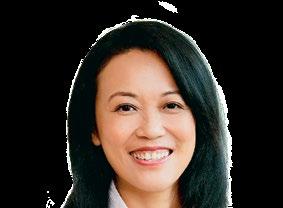
Some of the countries that Ms Low has worked in:
North Korea: As a Red Cross delegate monitoring and reporting on relief operations after typhoon Olga in 1999.
Afghanistan: Set up region-based multisectoral Monitoring & Evaluation systems with the Aga Khan Foundation before co-founding community businesses and a consulting firm — the Knowledge House — with a group of Afghan professionals.
South Sudan, North Sudan, Liberia: As a project administrator with Doctors Without Borders.

Myanmar, Thailand: Led a large-scale population survey with borderbased ethnic health organisations across conflict-affected areas of Myanmar, and continues to support and advise the multi-ethnic Health Information Systems Working Group to this day.

OPEN THE OLD PASSPORTS OF MS SHARON LOW AND YOU WILL FIND AN ASSORTMENT OF IMMIGRATION STAMPS AND VISAS FROM DESTINATIONS AS DIVERSE AS SOMALIA, NORTH KOREA AND AFGHANISTAN. Ms Low amassed this impressive collection during her time with various organisations in the humanitarian sector, including the International Organization for Migration, International Federation of Red Cross and Red Crescent Societies (IFRC) and The Knowledge House.
Believe it or not, it never crossed her mind when she enrolled in NUS to major in social work that her career would take her across borders, let alone some of the most militarised places on the planet. “I first came across the social work major by accident,

really,” she reveals. “In those days, we’d have to buy university prospectus booklets to figure out what we wanted to pursue for our undergraduate degree, and someone had left theirs behind at my void deck. Even though I was only in secondary school at the time, I picked it up — and nothing really spoke to me except social work.”
She adds that unlike many from today’s generation, she didn’t enter the programme wanting to help a particular cause, be it the environment, poverty or human rights. “But even without that altruistic nature, I knew that I wanted to help people, although how exactly, I wasn’t so sure.” What she knew was that she could make people feel comfortable around her. “Sometimes I would just be doing my homework at a void deck and strangers would come up to tell me their life struggles,” she recalls. “So even though I wasn’t sure at the time if the dots were meant to connect, I thought there would be no harm in exploring the spaces in between, and thus enrolled in Social Work.”
34 . THE ALUM NUS
Above and left: Ms Low’s humanitarian work has taken her to countries such as Liberia.
Her four years at NUS opened her eyes to the concept of community work. “It’s about getting different people’s perspectives. This is especially vital in the field of social work, where there are differences in perception, which need to be understood through either the lens of particular systems or political economies,” Ms Low explains, adding that even the concept of an ‘ideal state’ often differs among stakeholders. “In the international landscape, there is a strong top-down narrative,” she explains. “Recent years have witnessed a movement to shift that narrative to balance the power between stakeholders.”
This approach has guided Ms Low on her latest path, as one of the Managing Partners of a recent strategic alliance between three social enterprises in Singapore tentatively renamed Soristic-The Knowledge House. It promotes decision-making around project implementation, research, evaluation and policy advocacy together with locals to address core issues concerning their
communities “It’s not strictly what was taught in social work in Singapore but the application of concepts is relevant in humanitarian operations with acuity and sensitivity to politics and relationships,” she adds.
A CULTURE SHOCK

What Ms Low’s undergraduate degree did not prepare her for was the international nature of social work. Back in the 1990s, it was uncommon for tertiary students to go on exchange programmes. “As such, we were not really exposed to international affairs and foreign cultures, which is very different from the experience students have today,” she elaborates.
Thus, Ms Low had a bit of a culture shock when she was first exposed to cross-border work during an early stint at the IFRC. “As I was the only staff who had done Chinese as a first language, I was often asked to either help to translate or do interviews for the Chinese media. So when IFRC asked for someone to join their evaluation team for a Chinese flood relief operation in 1998, I was put forward as a candidate,” she recalls.
“I was sent there to help evaluate their projects. I eventually spent two months travelling between provinces.”

The experience exposed her to the possibility of working internationally at a professional level without going through the missionary or volunteer route. “It was a path less travelled but a path nonetheless,” she says. “After meeting many professionals who worked in the humanitarian space, I was keen to explore this path. It was not a typical one for Singaporeans back then. For many years, friends thought that I was a “professional volunteer”.
Ms Low is candid that in many ways, she was in the right place at the right time. “International humanitarian work up till then had been dominated by people from the West. So the fact that I was a ‘triple minority’ (female, young, Asian) made me quite an interesting candidate.” But she is quick to add that she still had to prove that she had the chops. “For the roles that followed, I had to send hundreds of resumes and applications,” she shares. “Eventually, it got easier as I gained experience and acquired the necessary knowledge and skills needed in this field.”
NURTURING GLOBAL GRADS
Driven by her own university experience and belief in the importance of international work, Ms Low took a break from her humanitarian career to work at NUS to support the set up of the NUS Overseas Colleges (NOC) in 2002.
NOC was a bold initiative by the then-NUS President Professor Shih Choon Fong and the late Professor Jacob Phang to immerse NUS students in leading entrepreneurial hubs around the world with the aim of inculcating entrepreneurship among the students and nurturing a new generation of technopreneurs.
Looking back at her time there, she says, “It was a unique opportunity. Back then, entrepreneurship was quite unheard of and it was seen as a ‘last resort’. But the team was confident that it would take root, and it has.”
She is proud to see how far NOC has come today, with some of the students being founders of successful startups and companies, with a few achieving unicorn status.
OCT—DEC 2023 35 TEXT BY ROY SIM PHOTOS COURTESY OF SHARON LOW
In the international landscape, there is a strong top-down narrative. Recent years have witnessed a movement to shift that narrative to balance the power between stakeholders.
A scene from Ms Low’s time in Afghanistan.
A photo taken in Somalia during an assignment to understand the situation of displaced people.
REACHING FOR THE STARS
AREMOTE SENSING NANOSATELLITE BUILT BY MULTIDISCIPLINARY STUDENTS
from the NUS College of Design and Engineering (CDE) has been successfully launched into orbit from the Satish Dhawan Space Centre near Chennai in southern India.
Galassia-2 blasted off at 9am on 30 July 2023 aboard PSLV-C56, a

rocket operated by the Indian Space Research Organisation (ISRO).
Galassia-2 is a 3U CubeSat class of nanosatellite, measuring 300mm in height, 100mm in length and 100mm in width, and weighs about 4kg. Its primary mission is remote sensing for agriculture and environmental change using a multispectral camera on board.

Galassia-2 was launched alongside six other satellites, including the 351.9kg DS-SAR, a Singapore-owned earth observation satellite.
‘SHAPING THE FUTURE’
After deployment, mission controllers spent the next few days stabilising and establishing contact with Galassia-2, checking that all the deployables have performed
correctly, and conducting functional tests for the satellite’s sub-systems before beginning the mission proper. It is expected to be operational for between six months and a year.
The project was conceptualised in 2017 by a team of research staff and developed with around 20 multidisciplinary Final Year Project (FYP) students from CDE’s Innovation and Design Programme (iDP) and Department of Electrical and Computer Engineering. “The successful launch and deployment of Galassia-2 is another demonstration of CDE’s leading role in training the next generation of space engineers here in Singapore,” said Professor Teo Kie Leong (Science ’92), Acting Dean of CDE.
“By bringing together students from various engineering disciplines, the Galassia project is an opportunity to push technological boundaries and shape the future of Singapore’s space industry. I hope today’s inspiring launch will encourage more students to develop their talents and skills in this important and fast-growing field.”
36 . THE ALUM NUS frontiers
Galassia-2 project leaders Mr Eugene Ee (right) and Mr Ng Zhen Ning (Engineering ’15) (left) overseeing integration of the satellite with the deployer system prior to launch.
Student-built satellite Galassia-2 blasts into orbit.
Photo: Indian Space Research Organisation
STUDENTS TAKE THE LEAD
Galassia-2 follows on the heels of the first Galassia nanosatellite launched in December 2015, which alongside Kent Ridge 1 became the first NUS-built satellites to go into orbit.

The project is supported by the Engineering Design and Innovation Centre (EDIC), the Satellite Technology And Research Centre (STAR) and the Centre for Remote Imaging, Sensing and Processing (CRISP) at NUS. “Galassia-2 is envisioned as part of a series of student-built nanosatellite projects,” said EDIC instructor and project leader Eugene Ee (Engineering ’14), who has been involved in the CubeSat development since the start of the project. “It builds on the knowledge gained from the Galassia experience in 2015 and features several in-house undergraduate student-developed components, such as the payload computer, solar panel release system, attitude determination, and control subsystem and battery pack.”
During Galassia-2’s mission, controllers expect to be in contact with the satellite on a weekly basis and will downlink images from it over the S Band frequency via the ground station at CRISP. Project leaders plan to include CDE students in the operations to provide training in performing mission control operations and encourage interest in space-based technologies.
Earlier this year, another NUS satellite, Lumelite-4, built by researchers at the NUS STAR Centre, was also launched into orbit aboard a PSLV rocket from the same space centre in southern India.

DREAMS TAKE FLIGHT
While a student at NUS, Mr Yohanes Evangelista Yudhistira (Engineering ’18) went through the Design Centric Programme (now known as the Innovation and Design Programme), which led to him being involved in the construction of Galassia-2. He is currently based in California, the United States, working for Parsons Corp on its satellite integration programme. He previously worked for SpinLaunch, helping to develop cameras able to withstand the extremely high G-forces of the launch system.

“As a student, I was responsible for developing the structure of Galassia-2, the mechanisms of the solar panel deployment system, and the vibration test plan. Subsequently, staying at NUS as a research engineer, I was responsible for the final structure of Galassia-2, including the solar panel deployment system, structural analysis and orbital thermal analysis, as well as preparations for vibration and thermal vacuum testing and integration of Galassia-2
Working on the Galassia programme helped me a lot in understanding the landscape of the space industry. It also armed me with the required skill set to thrive in the industry, such as design, analysis, testing and team collaboration, as well as project management.
Seeing Galassia-2 head into orbit, I felt a mixture of anticipation, excitement and relief, knowing that this culmination of multiple years of effort from students and staff was finally ready to fly.
My advice to those thinking of a career in space engineering: Stay curious, and always ask questions! Engineers are always excited to share what they know, and you can learn a whole lot of knowledge that will be useful in your career.”
Mr Ajie Nikicio (Engineering ’15) is another fromer participant of the Design Centric Programme, who worked on the first Galassia nanosatellite and then Galassia-2 as a research engineer. In 2020, he launched his own satellite technology startup, Netra.
“After graduation, working as a Research Engineer on the Galassia-2 project, I was responsible for developing the guidance, navigation and control (GNC) systems on the satellite, working with IDP students on both the hardware and software. Building on what we had learned from the first Galassia satellite, we wanted to push the technology further.
“Incorporating an imagery payload on Galassia-2 was not an easy task. The satellite avionics were far more challenging than the first Galassia — requiring, for example, higher energy capacity, bigger data storage, higher data transmission and more precise manoeuvring. Nonetheless, we wanted to prove that our team could launch increasingly sophisticated satellites despite our limited experience and resources, while also building up the capacity and know-how at NUS.
Working on a satellite project is complex by nature, involving many parts. I believe this made me rather accustomed to challenging projects and working environments, and shaped me to never be satisfied too early and always do better. The experience of working on Galassia-2 led me to pursue further graduate studies at the Massachusetts Institute of Technology (MIT) and eventually to launch Netra, a startup which aims to bring affordable satellite-based assettracking and connectivity services to industries operating in remote areas of Indonesia.”
OCT—DEC 2023 37
This article was first published on 30 July 2023 in the news section of the NUS College of Design and Engineering website.
One of the student teams involved in developing satellite testing equipment. From left to right: Mr Soh Eng Keng (instructor), Mr La Wunn Htet Aung, Ms Tan Ying Ying, Mr Seow Jing Ye, Mr Hong Wei Xun, Ms Luo Sha and Mr Eugene Ee (instructor).
Dentistry Class of 1972 Trip to Hainan
were most impressive. Along the way, we also got to savour some excellent Guizhou Moutai wine, visit the space launch site at Wenchang and take part in several karaoke sessions on the coach — all of which contributed immensely to the class members’ enjoyment.
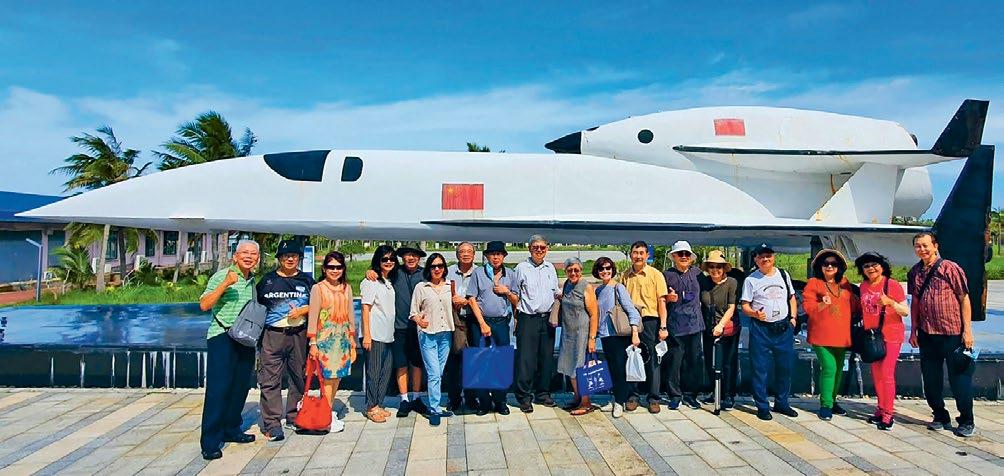
Of these experiences, the most memorable moments were the times we spent travelling on the bus together and sitting down at meal times to chit-chat. As we retold our undergraduate stories, we relived the joys of our student days once again. At this stage in our lives (most of us are in our 70s), we really value our friendships. What we also have in common is a sense of pride and belonging that we were all from NUS. We are planning to head to Malaysia to celebrate our 52nd anniversary next year!
With the exception of the COVID-19 years of 2020 and 2021, our class has been faithfully celebrating our anniversaries since 2012. It started because we happened to meet up at an NUS event at the time, and thought we should get together annually on selffunded, self-organised trips.
In June, we celebrated the 51st year of our graduation from NUS by heading to Hainan, China.

There were about 20 of us in the group, including our spouses. The seasonal June heat and humidity in Hainan did not deter our enthusiasm and camaraderie as we came together, under the leadership of our emeritus class representative Dr Loh Hong Sai (Dentistry ’72), for an eight-day round island tour.
Among the highlights of our trip were stays at the Haikou Museum and at Flower Island, whose modern accomodations

ALUMNI HAPPENINGS 38 . THE ALUM NUS
18-25
June 2023
CODE WOMEN - EMPOWHER:
Advancing Women in Tech and Design Leadership
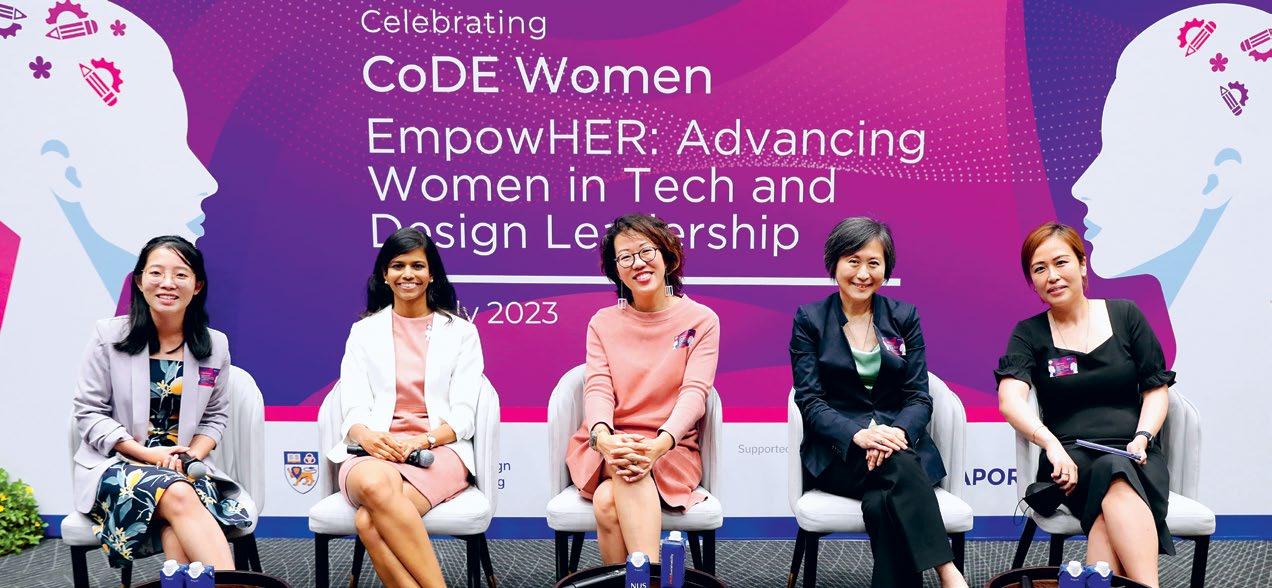
28 July 2023
The “CoDE Women EmpowHER: Advancing Women in Tech and Design Leadership” event took place on 28 July. With an impressive turnout of over one hundred people, the event welcomed alumni, NUS staff, members of the public, current undergraduates, and esteemed professors from the NUS College of Design and Engineering (CDE).
Three of the four guest speakers are NUS CDE alumnae. They are Ms Fun Siew Leng (Design and Environment ’83), Ms Joanne Teh (Design and Environment ’03), and Dr Aishwarya Bandla (Engineering ’17). Another guest speaker, Ms Huang Shan Shan, is a current NUS CDE undergraduate.
The panel discussion was moderated by Dr Eliza Fong
(Engineering ’09), a current assistant professor at the Department of Biomedical Engineering in NUS. She facilitated the flow of the discussion, guided the conversation, and ensured that diverse perspectives were represented, promoting inclusivity and diversity in the discussion.
Overall, the event was a success. On behalf of NUS CDE, we would like to thank our panelists for sharing their experiences and all attendees for celebrating this empowering and meaningful occasion with us. We look forward to seeing you again at future events.

To find out more about the event, please visit CDE Alumni Relations website at cde.nus.edu.sg/alumni/ alumni-happenings-2/ code-women-2023. Alternatively, you can scan this QR code.

OCT—DEC 2023 39
NUS Alumni Overseas Chapter Xiamen Visits ST Aerospace Technologies (Xiamen) Co. Ltd.
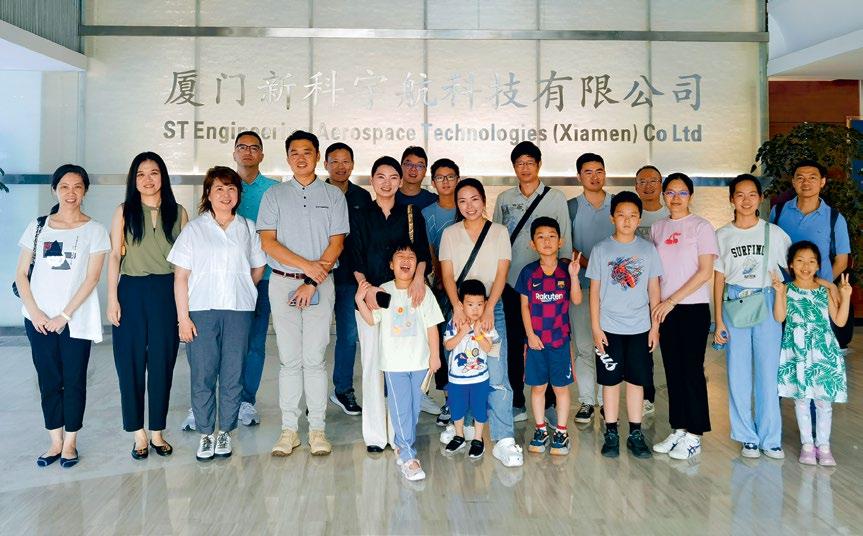
On 21 July, a delegation of some 15 alumni and family members, led by the Secretary of NUS Alumni Overseas Chapter Xiamen Dr Chen Min, paid a visit to ST Aerospace Technologies (Xiamen) Co. Ltd. The aerospace engineering company was jointly established between ST Engineering’s aerospace arm, ST Aerospace, and Xiamen Aviation Industry Co., Ltd (XAICO), to provide engine maintenance, repair and overhaul services. The visit was organised together with Transfong Ventures, a SingaporeChina cross-border venture building platform. Mr Ken Lim, CEO of ST Aerospace Technologies (Xiamen), received the delegation.
10th Year Anniversary Reunion for Pharmacy Class of 2013

On 8 August, the Class of 2013 from the Department of Pharmacy, Faculty of Science, had its first official get-together. This event also marked the 10th anniversary of the cohort’s graduation. It was a simple affair back at familiar grounds, with dinner and
drinks at NUS UTown’s Sapore Italian Restaurant. Besides the auspicious date, this National Day’s eve event also saw many attendees wearing the colours of red or white without any prior coordination. On such a befitting occasion, the close to 30 classmates had a delightful
time tucking into the freeflow food and reminiscing about good times. Many thanks to the NUS Office of Alumni Relations for its support in helping make this event a reality. All those present that night saw this as a commendable start for the class to keep in contact, and certainly look forward to attending the next event.

ALUMNI HAPPENINGS 40 THE ALUM NUS
21 July 2023
08 August 2023
ASA - NUS Cares @ ISCO, Jakarta


2 September 2023
Thirty-two intrepid NUS Alumni Sing-Along (ASA) travellers ventured into the heart of Jakarta Indonesia, to enjoy its rich cultural heritage, delicious cuisine and most importantly, to hold their first overseas NUS Cares event.
The event was held in collaboration with the Indonesian Street Children Organisation Foundation (ISCO). Mr David Suwarto (Business ’09), Chairperson of NUS Alumni Overseas Chapter Jakarta, was instrumental in helping with the logistics of the event along with Ms Julinda Dewi Simbolon, Executive Director of ISCO. ISCO’s aim is to help improve the quality of life of underprivileged children, and ASA members organised an engaging programme with many activities that brought fun and laughter to the youngsters present at the event.
Fifty children and five staff were treated to a tasty lunch, after which the children put up a charming and graceful dance performance. This was followed by a rousing, hand-clapping, foot-stomping song segment by the

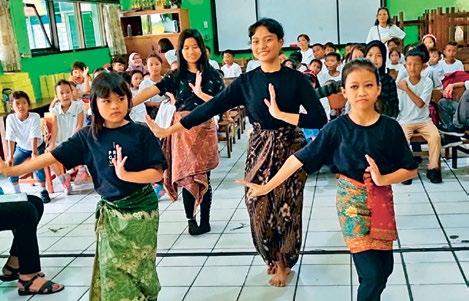
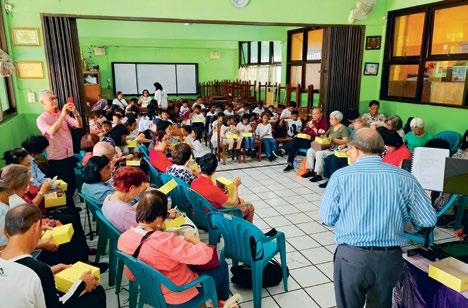
children. It was then games galore, and much laughter and excitement ensued as the children competed in groups to win prizes, gleefully comparing their treats. To the children’s delight, ASA then performed a series of songs to entertain them. The children also ‘oohed and aahed’ during the awesome magic show that amused and intrigued them.
The programme concluded with the handing out of snacks and milk for the 50 children and another 70 packs of snacks for the children from the surrounding villages.
ASA also made a cash donation to Merdeka Bermimpi, a programme that is aimed at exposing children to the careers they may want to pursue in the future.
In all, ASA fulfilled its mission of community service, friendship and thanksgiving, and we are grateful to have shared so much hope and joy with all.

OCT—DEC 2023 41
The AlumNUS thanks all contributors for the articles and photos in Alumni Happenings, showcasing our vibrant alumni community.
Planting the seeds of change
Having benefitted from student financial aid, Ms Regini Lee (Computing ’22) now gives back by contributing to the Plant-It-Forward Challenge — merging her support for education with her passion for the environment.
TEXT BY PEARLYN THAM PHOTO BY MARK LEE
When Ms Regini Lee was offered a place to study Computing at the National University of Singapore (NUS), the Malaysian national initially hesitated because she would be a full‑fee paying international student. Deciding that a good education was a worthy investment, her family took out loans, and she accepted the offer. However, when the COVID 19 pandemic struck, her father’s corporate training consultancy faced challenges as he could no longer conduct in‑person courses.

Fortunately, Ms Lee found financial relief from the University’s bursary donors. “During those troubled times, NUS kindly granted financial aid to me in the form of a donated bursary,” the 24 year old shares. “That was when I met my bursary donors, Mr Yeo Keng Joon (Business ’85) and Ms Kong Yuet Peng (Business ’86). I will always be thankful for their support.” Ms Lee completed her education, earning a Bachelor of Computing in Information Systems with Honours (Merit) in 2022. She now works as an Enterprise Architect and Engineer at the United Overseas Bank.
PAYING IT FORWARD
Through Mr Yeo and Ms Kong, Ms Lee became aware of the NUS Plant-It-Forward Challenge. This initiative not only supports the University’s Enhanced Financial Aid Scheme for students in financial need, but also has an environmental focus: Every S$1,000 gift will be recognised with a tree planted on one of the NUS campuses.
Drawing from her experience as a bursary recipient, Ms Lee understands the significance of financial aid to students in need. “I was planning on giving back to the school anyway, and once I started working, I decided to support the initiative,” she says. While Ms Lee has given back to society in various ways, this is her first one-off cash gift. In secondary school, she organised a book donation drive for underprivileged children. She also volunteers weekly with food distribution charity Food From The Heart. “I like the PlantIt Forward Challenge because it helps financially needy students and combats climate change,” she explains.
Ms Lee believes that the initiative offers an easy option for individuals to make a substantial
environmental impact, extending beyond the act of reducing plastic waste. “Supporting such an initiative with the right resources to help plant trees is very appealing to me,” the nature lover says. “I sincerely hope that the Plant-It-Forward Challenge will be a success — achieving its goal of helping financially needy NUS students and building a greener future. I also hope that my gift will alleviate the financial burden of a fellow student and inspire them to do the same in the future, as it did for me.”
On the potential concerns of fresh graduates about giving back, she adds: “Every dollar counts, and you’re welcome to give whatever amount you’re comfortable with. There’s no such thing as a small act of kindness. It’s the thought that counts.”
WHAT IS THE PLANT-IT-FORWARD CHALLENGE?
This fundraising initiative supports the Enhanced Financial Aid Scheme — which ensures that students, regardless of their financial circumstances, have access to a transformative education experience. Additionally, for every $1,000 gift to the Challenge, a tree is planted on one of the NUS campuses as part of the University’s sustainability efforts.

ALUMNI HIGHLIGHTS 42 . THE ALUM NUS
Join the Plant-ItForward Challenge today to build a better future for students and the earth alike. Please scan the QR code to make a gift.




lkcnhm.nus.edu.sg







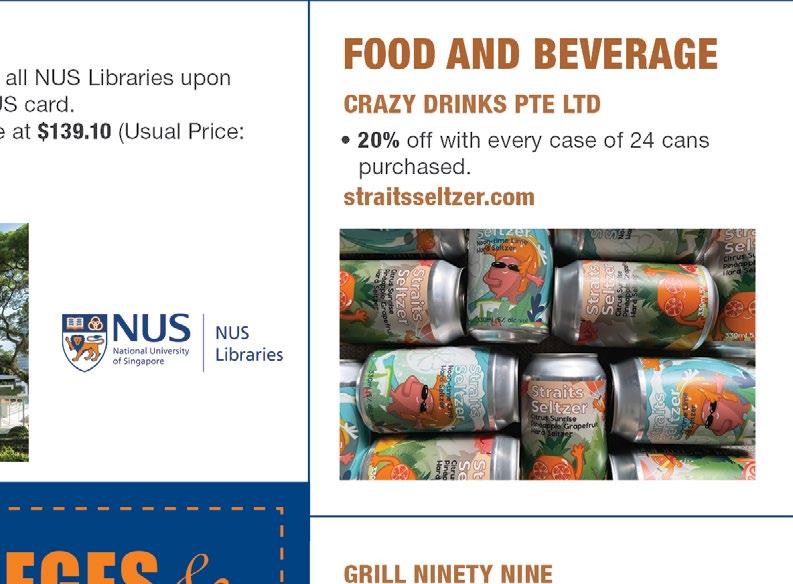

EDUCATION


BELIEVER MUSIC
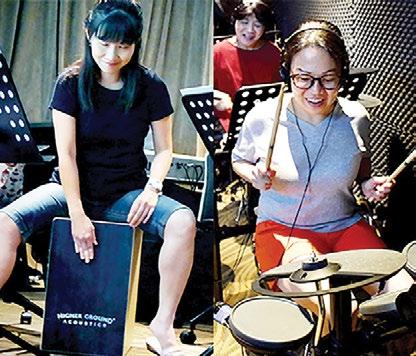
8% off Basic and Primer music modules at Believer Music online or at three selected in-store locations.
believermusic.com
FARONG MUAY THAI
30% off trial class (Usual Price: $35). 15% off all other classes.
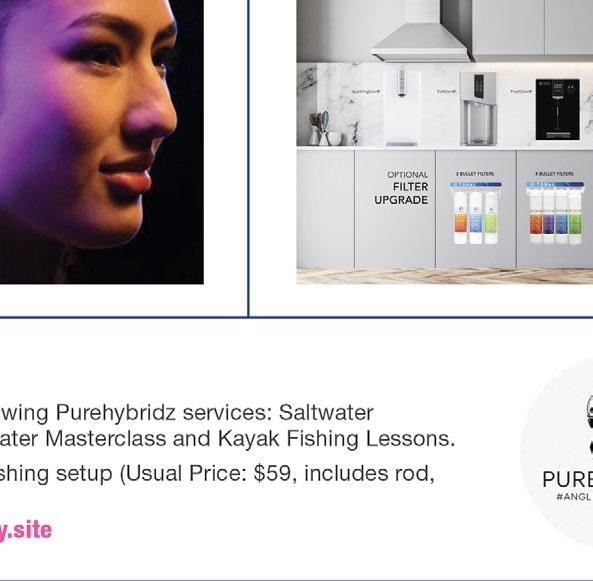
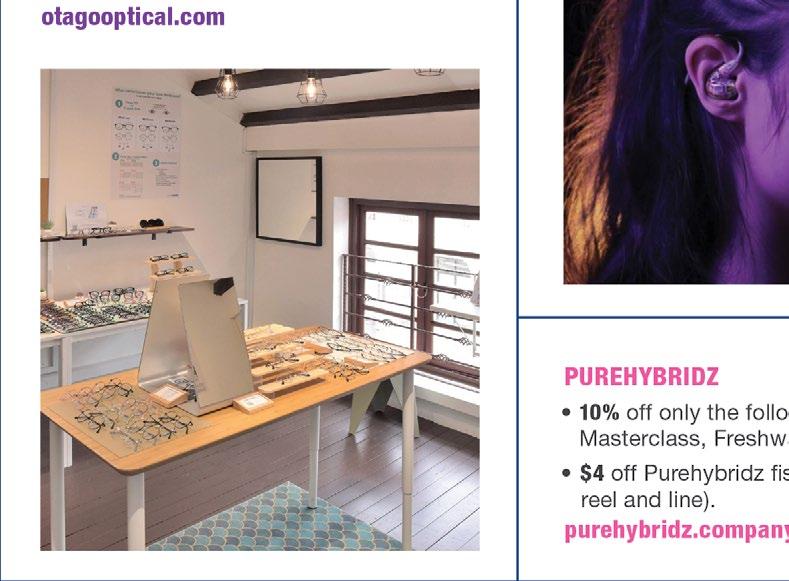




farongmuaythai.com

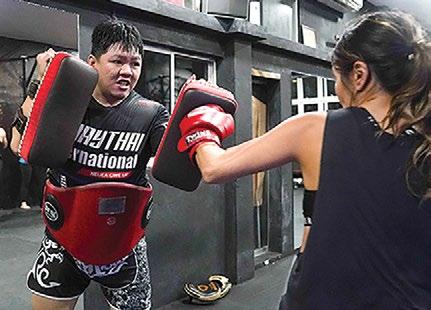
SAVEE - PALADIUM TECHNOLOGIES PTE LTD app.savee.sg
cashback LIFESTYLE
$5
LEAVING A LEGACY IN EDUCATION
THROUGHOUT HER LIFE, MS AGNES SNG HAS SEEN THE VALUE OF EDUCATION FIRST-HAND. “I spent more than a decade in less-developed countries and saw the struggles that many people face — and how many of these could have been alleviated through a good education,” she reflects. “Unfortunately, accessing that education often proved challenging.”
But it is not just in far-flung places that people struggle for an education; similar challenges have existed — and continue to exist — in Singapore, as Ms Sng has observed. As an undergraduate in the 1980s, she met many contemporaries who had to forgo school activities to take on part-time jobs. “These weren’t internships,” recalls Ms Sng, 64, “but jobs as salesgirls and tuition teachers because their salaries would help them pay for tuition fees and schoolbooks. I was fortunately supported by my family, so I could focus on school.”

Ms Sng could therefore immerse herself completely in university life, including extracurricular activities and after-school programmes. “These were valuable, as they helped me bond with my classmates in social settings,” she says. “I made lifelong friends in NUS.
Unfortunately, those who had to work part-time had fewer opportunities to fully enjoy the whole suite of activities that makes university life more enriching and forge close bonds with other students.” These bonds came
in useful later in her professional career. “Being able to call an old law schoolmate about a matter can make all the difference,” adds Ms Sng, who has held roles in banks, non-governmental organisations and the Singapore Academy of Law.
46 . THE ALUM NUS giving
Ms Agnes Sng (Law ’84) has pledged most of her Central Provident Fund (CPF) monies to NUS. She explains why.
Through the years, Ms Sng often came across news stories of students who had to give up their studies due to financial circumstances. “It was heartbreaking to hear these stories,” she shares. “That’s the reason why I gravitate towards bursaries.”
DOING HER PART
“The only certainty in life is death and I’m such a control freak, I like to organise things in good time,” she quipped. Wanting to do more than just make small annual contributions to bursaries, Ms Sng nominated NUS Faculty of Law as a beneficiary of a substantial portion of her Central Provident Fund (CPF) monies towards a bursary in 2015. “The nomination process at CPF is very easy and free,” she explains. “When I did it in 2015, there were just some forms to be filled out at the CPF office. These days, it can also be done online on the CPF website using your Singpass. It’s such a convenient way to leave a legacy,” she says.
Reactions to her decision were mostly supportive although one friend questioned why she had
MAKE A DIFFERENCE
Here’s how you can give back:
Make a charitable bequest by leaving a specific asset, sum of money, percentage of your estate or what remains of your estate after you have provided for other beneficiaries. You can also designate how you want your bequest to be used or leave it unrestricted so that NUS may direct the funds to where they are most needed at the time.

Nominate NUS as a beneficiary of your CPF monies. To find out more, visit cpf.gov.sg.
Designate NUS as the beneficiary of your insurance policy when the policy is no longer important to your family’s financial security.
Purchase an insurance policy and name NUS as both the owner and the beneficiary.
chosen to give to NUS. “He said, ‘NUS is a rich institution!’ But I feel that education institutions can never have too much money, if you want to have world-class faculty, staff and facilities for the students. Also, if you prefer your gift to directly benefit a financially needy student, you can always opt to give to a bursary.” She continues, “To me, bursaries have a unique purpose. They ensure that no one is turned away from an education because of a lack of resources,” explains Ms Sng. She adds that although her contribution is modest, it will still make a difference in someone’s life, if many people come together to donate. “It’s like when you go to a vast beach: it’s made of many granules of sand. Every bit helps.”
If you have any questions on how to make a planned gift to NUS, please email legacygift@nus.edu.sg or call +65 6516 8000. Alternatively, you can scan this QR code.

OCT—DEC 2023 47
Bursaries ensure that no one is turned away from an education because of a lack of resources.
A FRESH TWIST ON ’FRISCO
See the famed Golden Gate Bridge from a different angle, says Mr Arvind Ayyala (Engineering ’10), who calls the San Francisco Bay Area home.


Since its completion in 1937, the Golden Gate Bridge has attracted throngs of tourists from all over the world, and cemented its place as one of the United States’ must-see attractions. There are many vantage points from which to appreciate this engineering marvel, but Mr Arvind Ayyala fancies a unique one: from under it. “Consider taking a private boat and go under this 2,700m-long suspension bridge for a fresh perspective of this landmark,” suggests the investing partner at a venture capital firm Geodesic Capital. If you prefer a postcard
view of the bridge, head to Battery Spencer, a 19th century fort. “You’ll have to get to the other side of the Golden Gate Bridge and drive up the Sausalito Hills to get there. But the views are worth it,” he adds.
Mr Arvind certainly knows his way around the Bay Area, which refers to the counties surrounding San Francisco Bay. After all, he has lived here since 2017, when he relocated to run the North American operations of EDBI, the investment arm of the Economic Development Board. “I live in the outskirts of the city. Most of us with families move out of the city to get space for our kids to grow up,” says Mr Arvind, who is a father of two daughters. His family now lives in San Mateo County, which covers towns like Hillsborough and Palo Alto. Last year, he was appointed chair of the NUS Alumni Overseas Chapter San Francisco. “I feel energised by bringing people together,” he said in an interview with the Singapore Global Network earlier this year. “It has been a privilege to be invited into communities and shown the ropes along the way, and I’m just trying to pay it forward.”
ARVIND’S ‘FRISCO PICKS
To me, the best lunch spot in the city has to be Roka Akor, a contemporary Japanese joint that specialises
in steak, seafood and sushi. As a vegetarian, I don’t eat these, but they are happy to provide a vegan menu on request. Nestled in the heart of San Francisco’s Jackson Square, near the city’s financial district, it’s a good spot for a business lunch or a quiet dinner. Seafood is a San Francisco tradition and you’ll be spoilt for choice at Fisherman’s Wharf, one of the city’s busiest tourist areas. Friends tell me that the crab and clam chowder, served in sourdough bread bowls, is among the best in the world. It’s a vibrant area worth checking out, even if you aren’t a fan of seafood.
My favourite way to end the day is with the sunset at Golden Gate Park Set up a picnic mat on its gently sloping hill and take in the ocean views as the sky darkens above you.
San Francisco is home to so many famous neighbourhoods, each with a distinct character. My favourite is the Presidio, found within the Golden Gate Park. It’s quiet, serene and leads to some of the city’s best historical architecture. Not to mention the views of the Bay, both its man-made and natural sides.
Shoppers should make a beeline for Union Square, an exciting district that boasts the city’s best retail, dining and theatre experiences. You’ll find everything from designer boutiques to department stores there.
San Francisco is synonymous with its hilly landscape and even those who haven’t been to the city can easily picture its many sleep stopes. “Many may think San Francisco was built on seven hills, similar to Rome, but in fact there are actually around 48 or 49 in the city!”
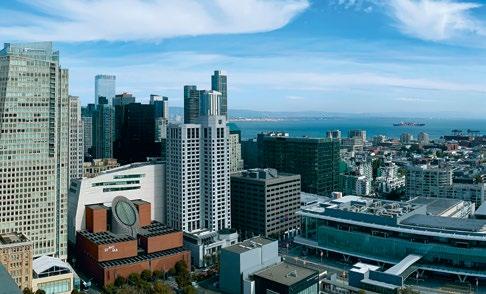
ALUMNI INSIDER 48 . THE ALUM NUS
Mr Arvind and his wife Anusha, against the backdrop of the Golden Gate Bridge.
An aerial view of San Francisco’s Museum of Modern Art and the Bay Area beyond it.
The city’s Ferry Building and piers at sunset in the springtime.
THE HILLS ARE ALIVE


your alma mater: legacygift@nus.edu.sg www.facebook.com/NUS.Giving +65 6516 8000 www.nus.edu.sg/nusgiving LEGACY CREATE OUR FUTURE CREATE A Call us today at +65 6516 8000 or write to us at legacygift@nus.edu.sg
Nominee: UEN: 200604346E Registered address:











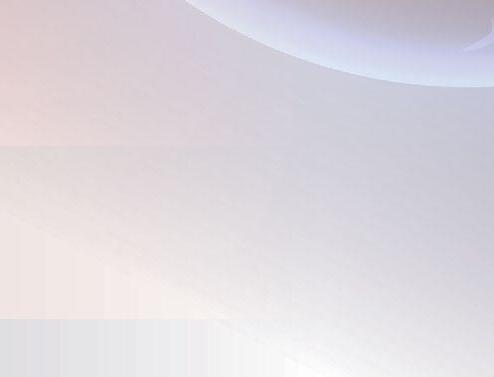










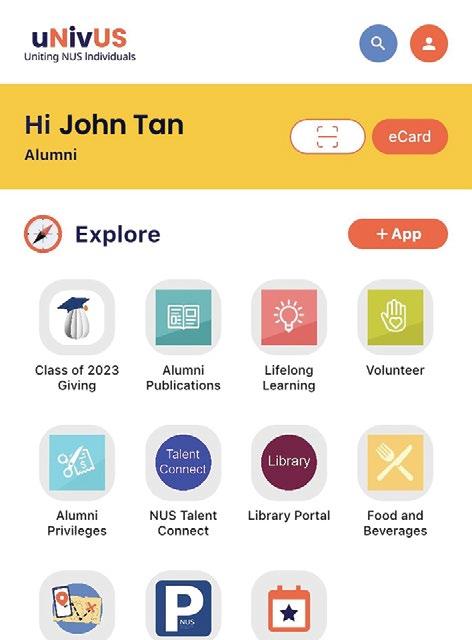








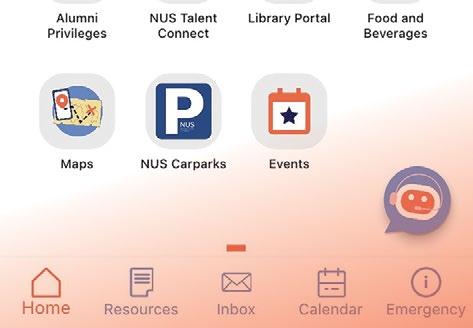
Let's Keep In Touch u N iv US - the gateway app uniting NUS individuals, connecting you to key University services and experiences. Download u N iv US Now STAY CONNECTED!











 TEXT BY FRANCIS KAN
TEXT BY FRANCIS KAN








 TEXT BY CHARMAINE CHAN
TEXT BY CHARMAINE CHAN





 TEXT BY AUDRINA GAN
TEXT BY AUDRINA GAN













 Mr Yap (left) and Mr Ng Chee Chiu (Computing ’04) get serious at Splendour during board game night.
Ms Adeline Fam joins her husband, Mr Yap, and other group members in a spirited round of Blokus and Splendour
Mr Yap (left) and Mr Ng Chee Chiu (Computing ’04) get serious at Splendour during board game night.
Ms Adeline Fam joins her husband, Mr Yap, and other group members in a spirited round of Blokus and Splendour







 The latest batch of Peer Student Supporters at the PSS Induction 2023. Peer Student Supporters at a booth at the Student Life Fair 2023.
The latest batch of Peer Student Supporters at the PSS Induction 2023. Peer Student Supporters at a booth at the Student Life Fair 2023.

























































































































































